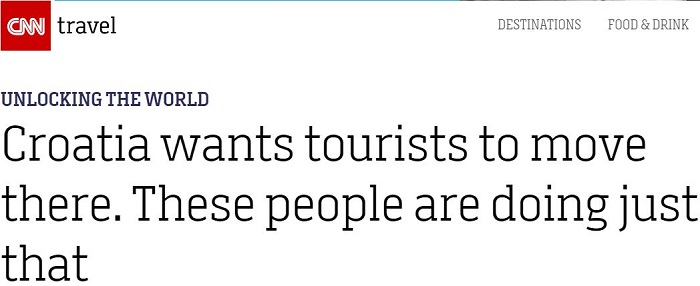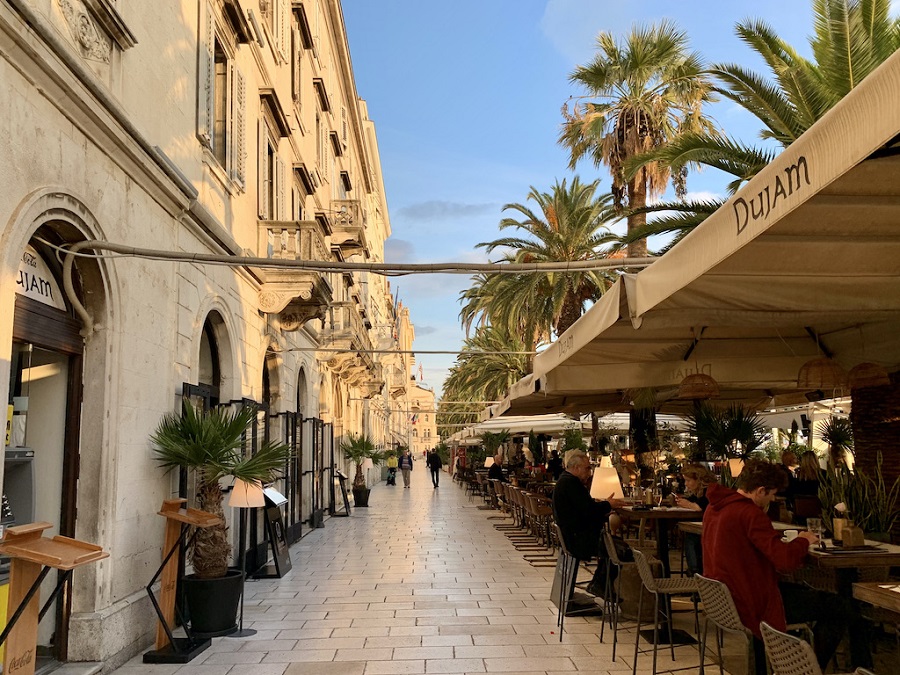Hvar Digital Nomad Life with Kids: an Emerging Lifestyle
February 23, 2021 - After a long absence, one of the writing stars of the early days of Total Hvar is back - Ivana Zupan on Hvar digital nomad life with kids, an emerging lifestyle.
Three years ago, after living on Hvar for 10 years full time, I decided that I had to leave. Coming and going to the island was a great way to cope with its many downsides, and it allowed me to enjoy all the good there was. I was able to take my vacation during the summer months, for example. What a no-go for many islanders...
Back then, being a mother of an unschooler, I came to realise that without a like-minded community, I will not be able to keep my lifestyle, so I opted for city life to see if this would work out. We were lucky to find a great community in Bratislava. Our home-schooling study group - DOBROdruzstvo is the warmest, coolest and most amazing place for kids. Its fundamental sense for creating and nurturing relationships between people, building responsibility in our children’s own education, and emphasis on cooperation and solution finding is something which means a lot to me and to my daughter. I feel blessed and grateful for being a part of it for the last year and a half. The study group has a base in Bratislava, with a nice 'school' building and an outdoor space. Allowing the kids to come together and interact in a respectful environment. So it was, until recently.
In today’s world, there is probably not a country, where COVID measures would not affect our lives. There are different approaches with different results, some countries tend to be more strict than others, and the effects of such measures have been much debated. Slovakia is one of the countries where measures can be easily described as a Nazi-like experimentation camp. Forced COVID-testing once per week, or you are not allowed to go to work, to the bank, to the post office, send your kids to school etc. Not to mention, that masks are mandatory outdoors.
When this testing-madness was introduced back in October last year, I felt so angry as I was watching democracy in my homeland taking this huge slap in the face. More so that people were being obedient and supported it by attending the mass-testing. Very few of us found the strength to rebel against this blackmailing approach. Not an easy task in such a suffocating atmosphere, I must admit. I managed to stay sane by focusing on keeping our little homeschooling community going. Feeling that by continuing to create something new, while the old system was crashing down was the best I can do, given the circumstances.
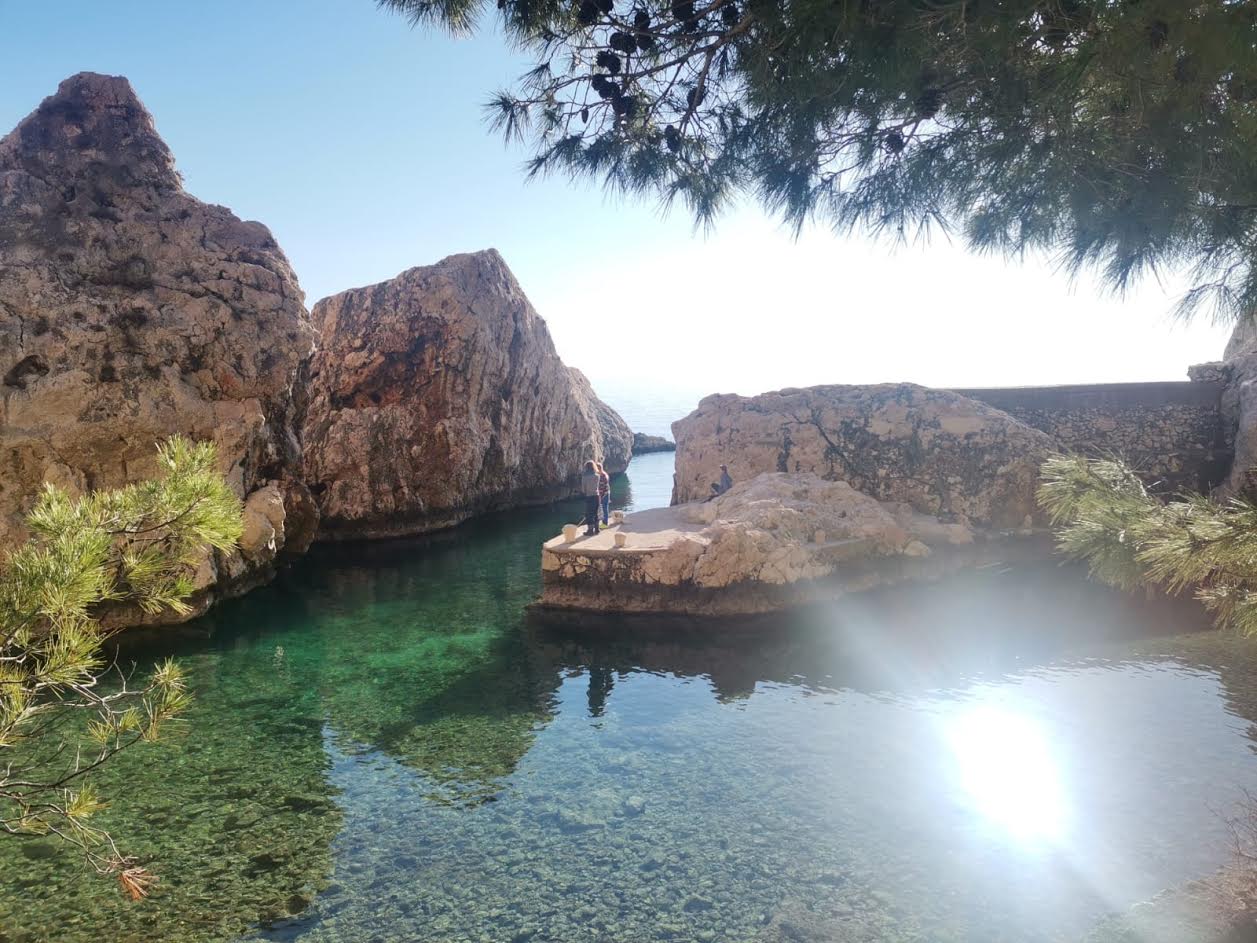
(A haven for kids to play hide and seek. Photo: Mgr. Daniela Bohata)
Now we are back on Hvar. For two months now. I decided not to play along with the once-per-week-COVID-testing-or-you-are-not-allowed-to-live game. Back to unschooling. Looking for a small community with a few kids to join forces with other parents. Spending a lot of time outdoors with the kids. We are rediscovering the island and its hidden gems – like the Cliffbase in Sv. Nedjelja, where Katarina is slowly creating a digital nomad community. I hear there are still a few spots available.
The weekend trip to Cliffbase left me amazed about what a dedicated man can create at the end of the world. A wine cellar literally carved by hand in these huge rocks, just to name one. Miro Štec spent the last 20 years building this place. A lot of love and hard work went in.
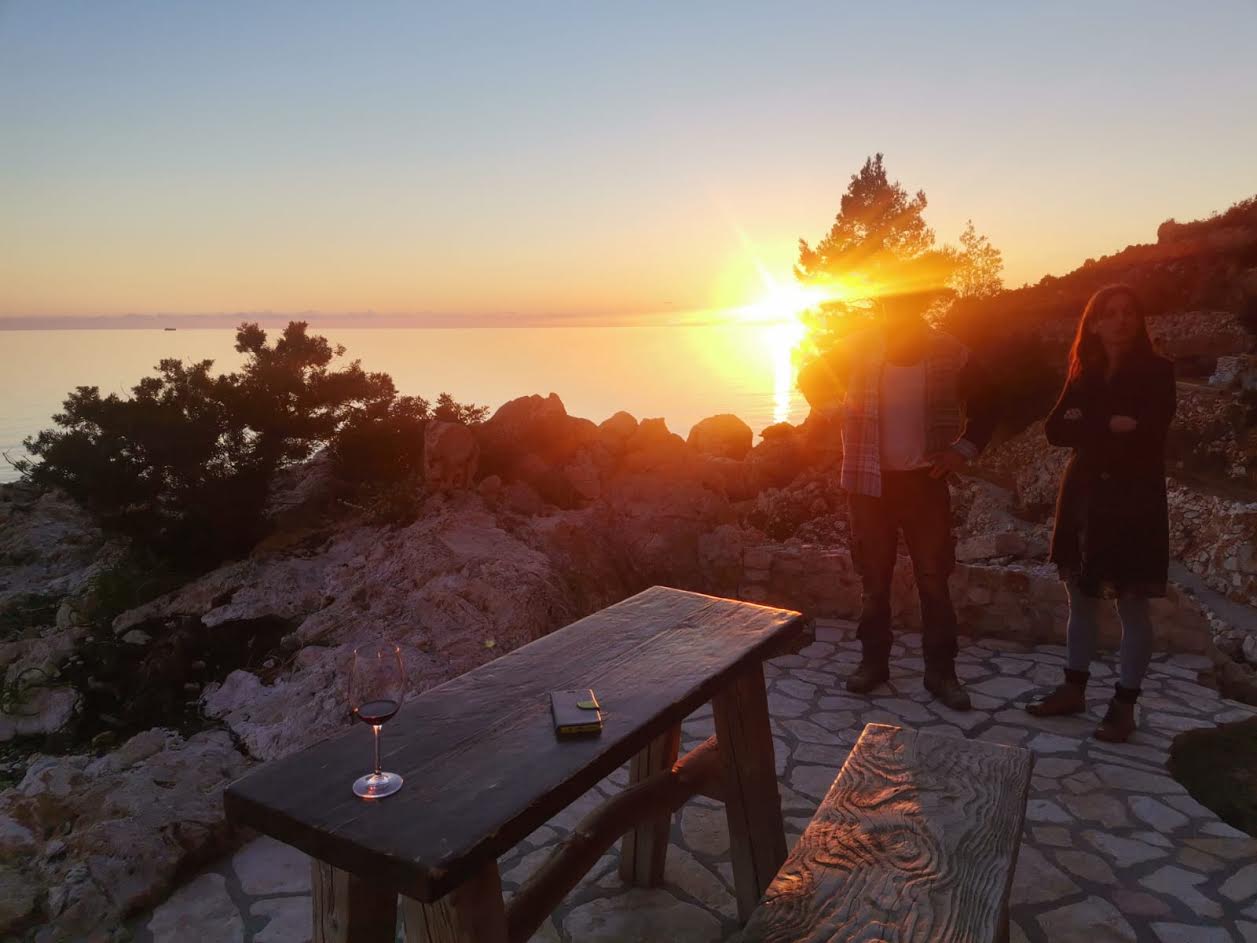
(A sunset at the Cliffbase in Sv. Nedjelja on Hvar. Photo: Mgr. Daniela Bohata)
I am not a climber, but I imagine it must be a heaven for them too. Not to mention I wanted to be 10 again to be able to play there at all those big rocks and hidden caves. Swimming in February, sharing food and stories with other mums. The flow there was simply perfect.
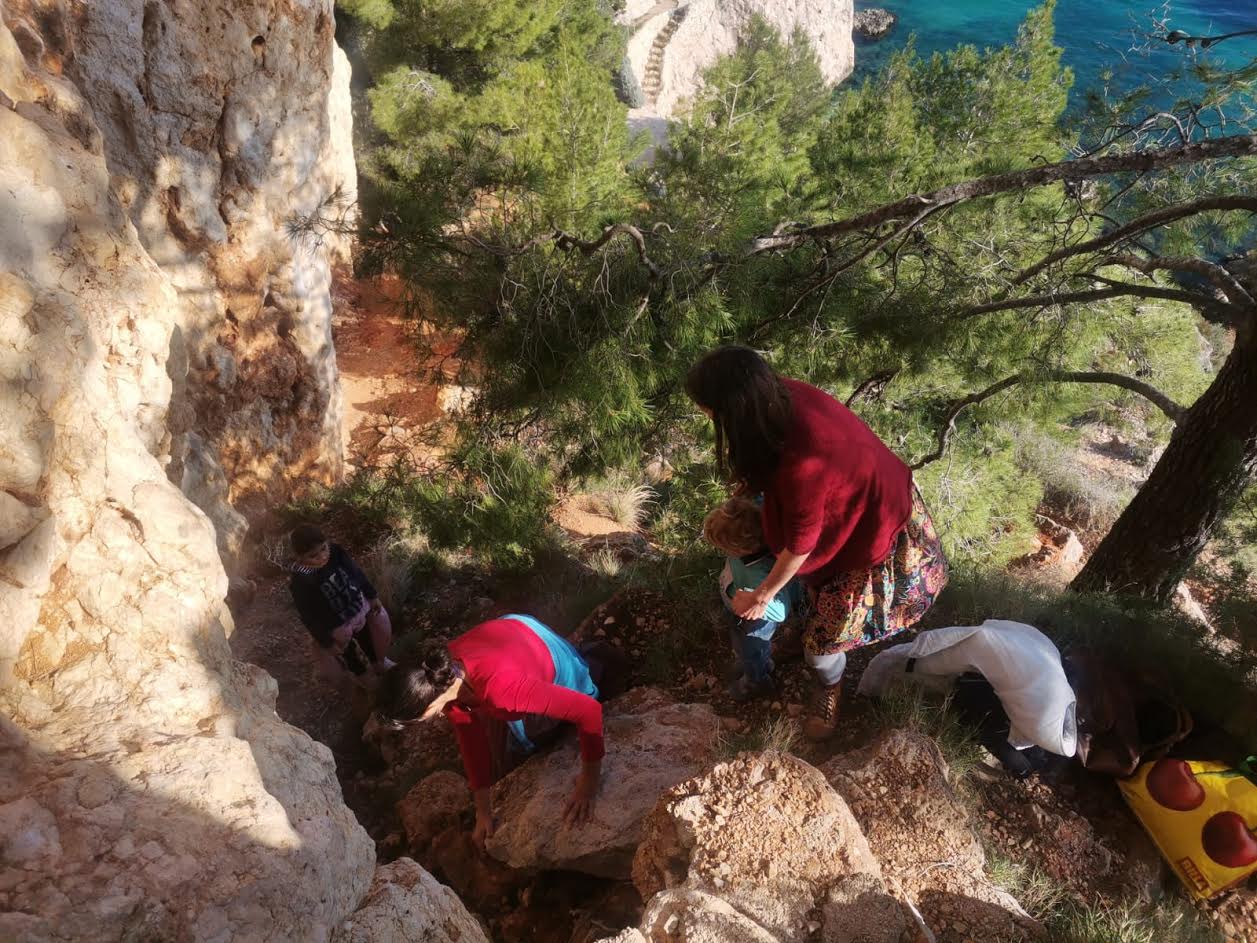
{The steep path was a bit of a challenge for us, mothers, but the good old-fashioned cooperation helped, and we managed. Photo: Mgr. Daniela Bohata)
Daniela, the author of the beautiful photos came all the way from Makarska and now we are thinking about repaying her the visit and might be exploring Biokovo the next weekend. Let’s see how that one goes. In the meantime, you can find more about her work as a tour guide on her website.
If last year taught me something, it was not to plan that much. A huge lesson for me - the organised one. But, slowly, I am getting used to it - not knowing how this will progress, I am enjoying what I can while I can. So, here it is, a call to all digital nomads with kids out there. If on Hvar, get in touch.
If you are digital nomads with kids and planning on a stay on Hvar and would like to contact Ivana, email us on This email address is being protected from spambots. You need JavaScript enabled to view it. Subject Hvar kids.
People from all over the world are already enjoying the Hvar digital nomad lifestyle. Read more in Digital Nomad Life in Croatia: Jess and Thibaud, from San Francisco to Jelsa.
The Croatian government has now published guidelines on how to apply for the Croatian digital nomad visa.
Meet Melissa Paul, Owner of Croatia's First Digital Nomad Visa.
Health Insurance for Digital Nomads in Croatia is Now Enabled
February 20, 2021 – Digital nomads in Croatia have the right to health care, as the issue of health insurance for digital nomads in Croatia is now regulated.
As HRturizam reports, on Thursday, the Government sent amendments to the Law on Compulsory Health Insurance and Health Care of Foreigners in the Republic of Croatia to the parliamentary procedure. They are harmonized with the Aliens Act to regulate the manner of exercising the right to health care for digital nomads. The amendments thus enable the realization of the health care right for digital nomads.
By the official definition, a digital nomad is a third-country national who is employed or doing business through communication technology for a company or their own company that is not registered in Croatia and does not do business or provide services to employers in Croatia and has been granted temporary residence in Croatia.
As Health Minister Vili Beroš explained, a digital nomad is not obliged to apply for compulsory health insurance. Still, they are obliged to bear the costs of using health care in a health institution, i.e., with a private practice health worker or other health care provider in Croatia.
By amending the Law on Foreigners, Croatia has introduced the concept of digital nomads who now have preferential tax treatment. Legal changes regulate the tax exemption for receipts of digital nomads – foreigners who work online from Croatia for other countries' employers.
The new Law on Foreigners for Digital Nomads prescribes a tax exemption for their income based on the status thus acquired. All this to facilitate their decision to choose Croatia as a place of residence and work.
This way of regulating their stay in Croatia assumes that digital nomads will spend their earnings here while living in our country and thus positively impact the domestic economy.
Temporary residence is granted for up to one year (possibly shorter). However, the temporary stay cannot be extended. A request for re-regulation of the digital nomad's stay may be submitted six months after the digital nomad's temporary stay expiration.
As Jan de Jong, the initiator of the introduction of visas for digital nomads, has repeatedly pointed out, when a digital nomad would spend at least 10,000 kunas a month on living in Croatia, which is more than realistic, for about 50,000 potential digital nomads (as many as there are in Bali), that would mean a revenue of about 500 million kunas a month into the Croatian economy.
At the moment, the publication of the online system for electronic submission of applications for digital nomads is still pending and will be done soon. But before that, the Ministry of the Interior announced the procedure for obtaining visas for digital nomads.
To read more about digital nomads in Croatia, follow TCN's dedicated page.
CNN Features Croatia's Digital Nomad Opportunity
February 12, 2021 - The story is slowly spreading around the globe, as CNN features Croatia and its digital nomad opportunity.
Sometimes, just sometimes, things can go smoothly in Croatia, where forces align and things actually change - and change for the better.
It is less than a year since I had a chat with Dutch entrepreneur Jan de Jong to talk about some interesting topics about Croatian tourism for a panel he was sitting on, among them the potential of digital nomad tourism. What happened next is known by anyone following the topic, as de Jong's persistence following his open letter to Prime Minister Andrej Plenkovic, asking for a digital nomad visa for Croatia, paid off. Just 44 days later, Plenkovic tweeted a photo of him and de Jong, announcing that he would introduce changes to legislation which would allow the visa to come into effect, which would have made Croatia only the second country in Europe (after Estonia) and the fifth in the world at the time, to introduce the visa.
Observers of the wheels of change in Croatian bureaucracy looked on with interest. Someone had clearly oiled the wheels, for not only were changes to the tax code and Aliens Act in place for January 1, 2021, but just 199 days after the PM's announcement, Croatian bureaucracy officially welcomed its first digital nomad. You can read all about her and how she did it in this TCN interview - Meet Melissa Paul, Owner of Croatia's First Digital Nomad Visa.
Soonafter, the Ministry of the Interior published guidelines for those wishing to apply for the 12-month stay. A shiny new website and online application procedure is promised from next month.
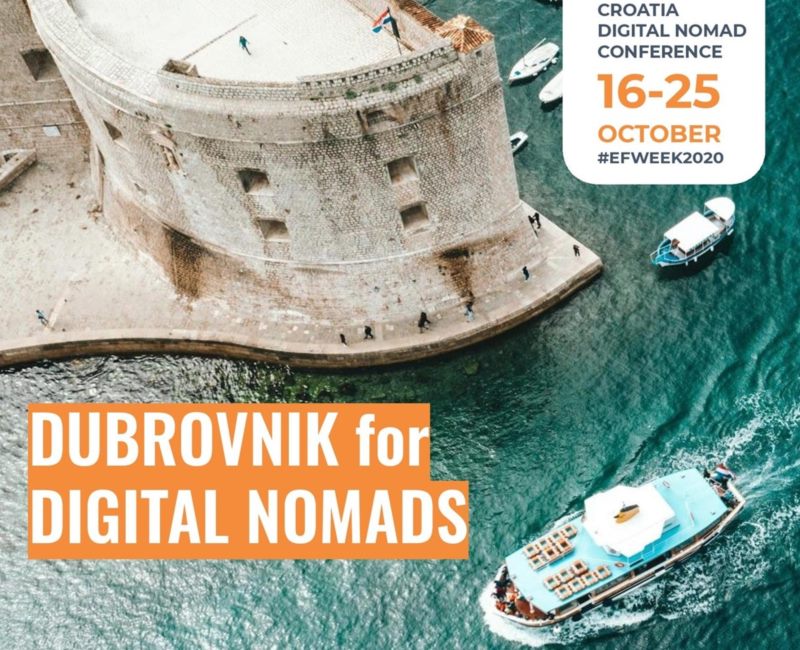
The first digital nomad conference in Croatia was held in Dubrovnik in October. Organised by Tanja Polegubic of Saltwater Nomads, in partnership with the City of Dubrovnik, the Dubrovnik Tourist Board and TCN, it reached a worldwide audience, and even got a mention in The Washington Post. A followup project in Dubrovnik is scheduled to be announced shortly.
And the international column inches continue, with CNN the latest to feature Croatia and the digital nomad lifestyle. In addition to the first successful visa applicant, Melissa Paul, the feature also talked to a nomad from Singapore in Zagreb, as well as a Mexican couple in Split. There are currently numerous applications being processed by Croatian immigration, from New Zealand, South Korea, USA and UK, to name but four countries.
You can read the CNN article in full here.
For the latest information about digital nomads in Croatia, follow the dedicated TCN section.
Digital Nomad Life in Croatia: Megumi Hosogai, from Hawaii to Opatija
February 9, 2021 - As the number of digital nomads rises globally, some are choosing to spend some of their time in Croatia. Continuing our TCN series meeting international digital nomads calling Croatia their temporary home. Meet Megumi Hosogai, from Hawaii to Opatija.
Tell us about you and your work.
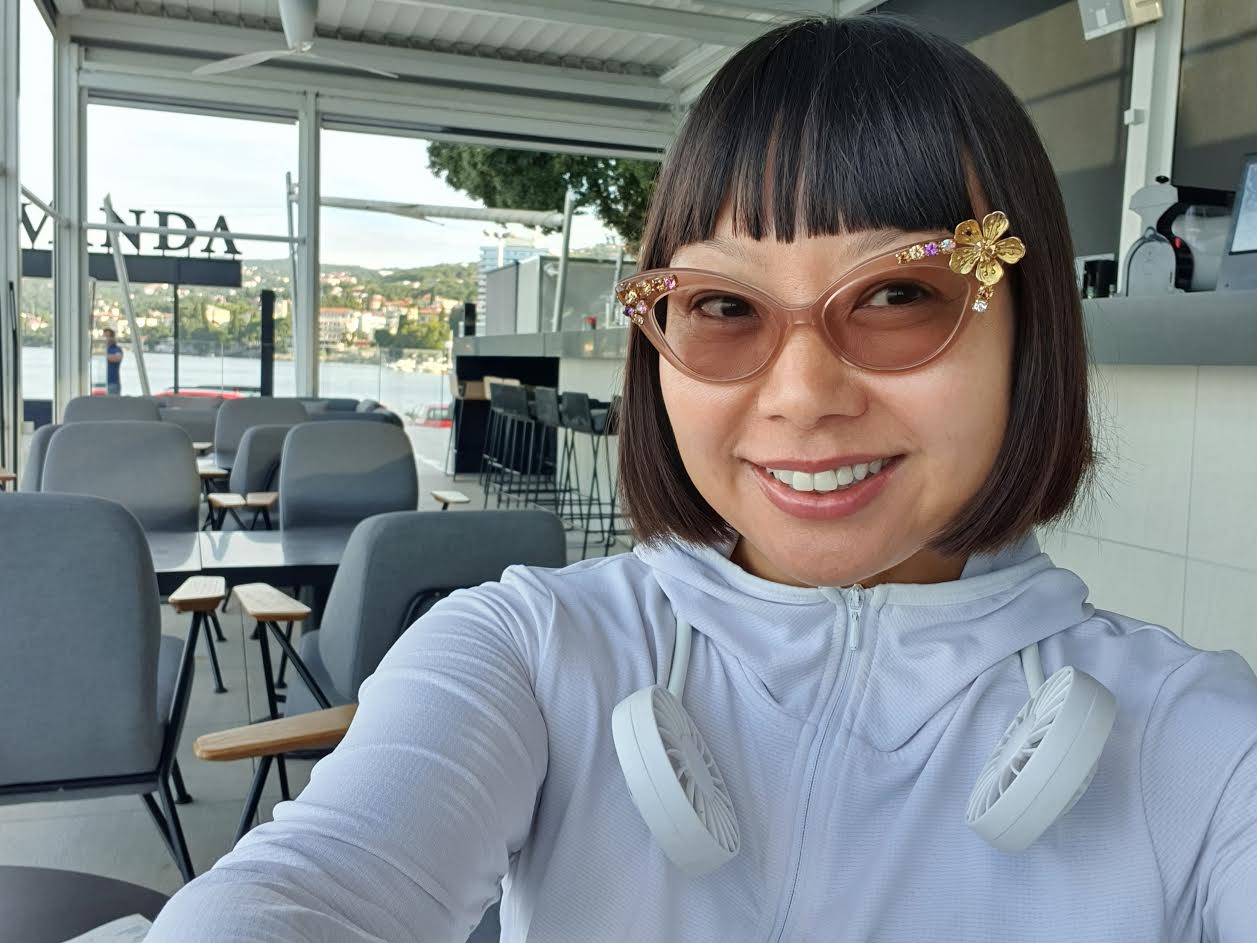
I was born in Japan and I grew up as a Japanese Expat kid in Hawaii. I went back and forth twice and had to learn Japanese and English twice. My parents realized my personality wasn’t fit for life in Japan and decided to stay in Hawaii. I went to college in Los Angeles and New Orleans and settled in Los Angeles until 2017. I’ve worked as an actress, then a commercial real estate agent until I founded my sunglasses brand MEGUMI-O. MEGUMI-O drop ships from California. In February 2016, I flew to Milan to attend Mido, an optical expo and I fell in love with Milan. I moved to Milan in April 2017 and traveled all over Europe.
How did you choose Croatia and specifically Opatija?
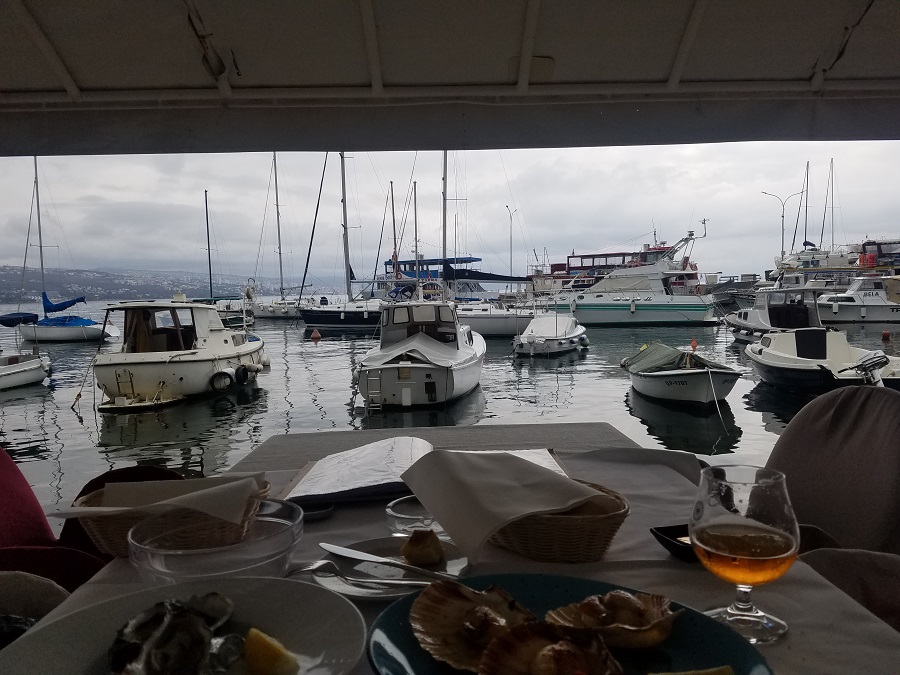
In summer 2019, I did my bus tour of Croatia starting from Dubrovnik finishing up north in Pula. As soon as I saw Opatija, I fell in love with it and decided to spend the month of January 2020 in Opatija to see if I would still like it during the coldest month. Having a dog that’s too big to fly in the cabin, Opatija is convenient since I can take a train from Milan to Trieste and have a driver pick me up there. I loved Opatija last January so I booked a month from July to August. The Covid situation is far worse in Milan and I was having such a great time with my new friends I ended up staying. I bought an apartment from an Albanian man who I communicate with in Italian. Being one of two Asians and one of two Americans in Opatija, I’ve become a bit of a local celebrity. I was discovered by FoodyTV a streaming service in the US on Instagram and I started filming my travel series “According To Megumi.”
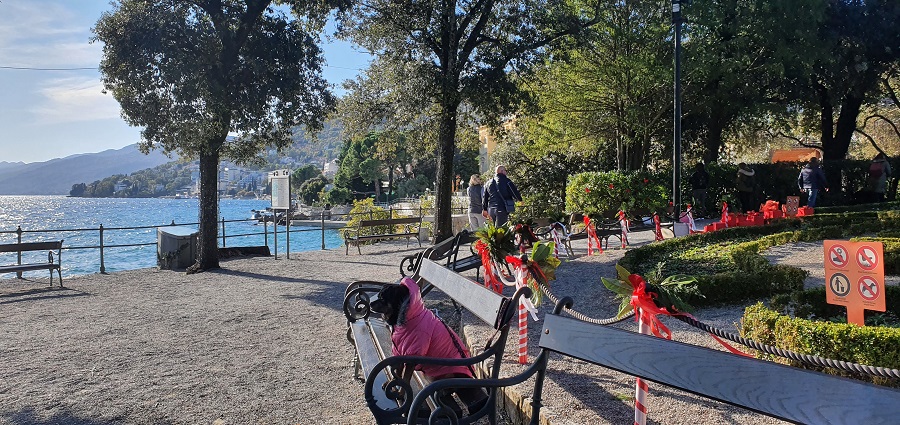
Pros and cons of working remotely?
Pro, I can shoot “According To Megumi,” invest in real estate, and promote MEGUMI-O from anywhere in the world. Pro, the cost of living in Croatia is cheap. Another reason beyond Covid that keeps me from rushing back to Milan, is the US Dollar is low now and the Kuna is much cheaper than Euro. Con, Opatija and Europe outside of Spain and France are not exactly entertainment industry countries so I can’t just call a friend to shoot and edit me. A camera person or editor who doesn’t speak English as a first language doesn’t understand my humor and timing. Pro, I could dropbox my videos to my friends in the future to make the edits tighter.

What’s important for a destination to offer to be compatible with a digital nomad lifestyle, apart from good WiFi?
A community of English speaking people and Amazon. Without Amazon, I have had to live without many things. Mall.hr is NOT Amazon. If you’re ethnic like me, it would be best to be in a city where you can find decent ethnic cuisine. While I will always summer in Opatija, I Google sunnier winter locations constantly to see if they have an Asian population. As soon as I’m vaccinated, I will fly to Budapest to eat Escargot at the French Institute and Pho. Brussels also has great Vietnamese food and a Michelin star sushi place.
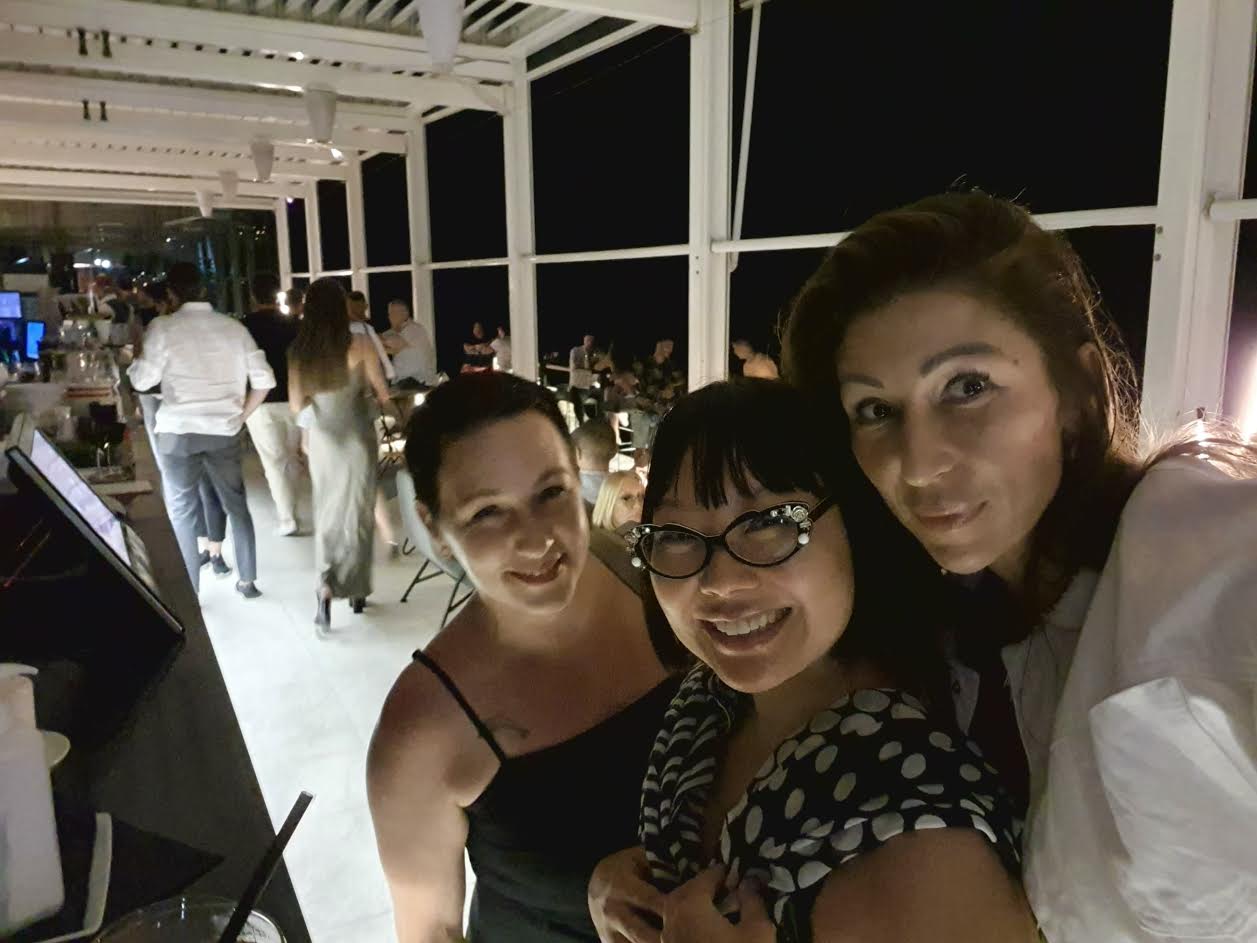
What’s your view on the future of remote work?
Covid has made the world super friendly for remote work. A classmate who saw According To Megumi is trying to move to Opatija. He’s now based in London with a Japanese corporation and he’s trying to get them to agree to let him leave London since he’s just been working from home for the last year. If you can make money in a high currency and live in a country with a low currency, you can live very well without grinding so much.
Do you have any advice for people looking to make the transition to digital nomad life?
Save money before making the move. Be flexible and learn at least a second language. I communicate with a lot of people in Italian in Opatija. The owner of a fast-food restaurant I frequent is a Spanish man married to a Croatian woman and he speaks Spanish, Italian, Portuguese and German. Off-season, you can find yourself in situations where the workers of a certain restaurant or store are no longer the young ones off from school who spoke English. Before making the move, search Google in the country where you’re considering the move, to see if you can buy things you MUST have. Even if a country has Amazon, Amazon and eBay don’t offer the same things throughout the world.
You can follow Megumi Hosogai's adventures on her official website.
Are you a digital nomad in Croatia who would like to be featured in this series? Please contact us on This email address is being protected from spambots. You need JavaScript enabled to view it. Subject Nomad
Read more: Meet Melissa Paul, Owner of Croatia's First Digital Nomad Visa.
Croatian Digital Nomad Visa: Government Publishes Official Guidelines
February 8, 2021 - Guidelines for the application process for the Croatian digital nomad visa have been published by the Ministry of the Interior.
As we await the online application process and dedicated website, the Ministry of the Interior has published guidelines and costs for the application process for the new Croatian digital nomad visa. So far, 11 successful applications have been accepted and in processing - from the UK, USA, South Korea and New Zealand.
The guidelines in full:
Temporary stay of digital nomads
A DIGITAL NOMAD IS a third-country national who is employed or performs work through communication technology for a company or his own company that is not registered in the Republic of Croatia and does not perform work or provide services to employers in the Republic of Croatia.
Temporary stay is granted for up to a year (possibly even less) and it cannot be extended. A new application for regulating a stay of digital nomads can be submitted 6 months after the expiry of the previously granted temporary stay of digital nomads.
Close family members of a digital nomad who has been granted temporary stay in the Republic of Croatia may join him in the Republic of Croatia (see temporary stay for the purpose of family reunification here).
APPLYING FOR TEMPORARY STAY
The application is submitted to the competent authority depending on whether a third-country national is or isn’t required to hold a visa to enter the Republic of Croatia. Information on the visa system can be found here.
IF YOU ARE REQUIRED TO HOLD A VISA TO ENTER THE REPUBLIC OF CROATIA:
you can submit your application abroad at a diplomatic mission/consular post of the Republic of Croatia (list of diplomatic missions/consular posts can be found on the website of the Ministry of Foreign and European Affairs http://www.mvep.hr/hr/predstavnistva/dmkurh-u-svijetu/).
IF YOU ARE NOT REQUIRED TO HOLD A VISA TO ENTER THE REPUBLIC OF CROATIA:
you can submit your application at a diplomatic mission/consular post of the Republic of Croatia or at the competent police administration/police station according to your temporary residence address (you can find the list of police administrations/police stations here or you can contact the competent police administration/police station for further information on submitting your application in compliance with the epidemiological measures in force due to the COVID-19 epidemic).
APPLICATION AND DOCUMENTATION
Copies of documents should be submitted in the Croatian or English language.
1. Fill in Form 1a (bilingual form available here) and enclose the following:
2. copy of a valid travel document (period of validity of a travel document must be three months longer than the period of validity of intended stay)
3. proof of health insurance (travel or private health insurance must cover the territory of the Republic of Croatia)
4. proof of purpose (contract of employment or other document proving that the person performs work through communication technology for a foreign employer or his own company which is not registered in the Republic of Croatia), that is
- statement from the employer or third-country national (as proof that the person performs work through communication technology), and
- contract of employment or service contract with a foreign employer, or
- copy of the registration of his own company and proof that he performs the said tasks through his own company
5. proof of means of subsistence during his stay in the Republic of Croatia,Until the adoption of a new Regulation on the manner of calculating and the amount of means of subsistence for third-country nationals in the Republic of Croatia, you can submit a bank statement or proof of regular income to your account in which you must have available a minimum of HRK 28,800 for a period of 12 months.
6. proof that he/she has not been convicted of criminal offences from his/her home country or a country in which he/she resided for more than one year immediately before arriving in the Republic of Croatia. Information on the legalization of documents can be found here.
7. provide address in the Republic of Croatia
When submitting your application and filling in your form, you will be required to provide your address of stay or of intended stay in the Republic of Croatia. This is important for determining the police administration/police station which is locally competent for processing your application. If this is the first time you are applying and you do not have an address in the Republic of Croatia, you can provide a temporary address as the address of your intended stay (hostel/hotel if you have a reservation/confirmed reservation of accommodation).
AFTER YOU RECEIVE NOTIFICATION ON GRANTED TEMPORARY STAY
IF YOU ARE REQUIRED TO HOLD A VISA TO ENTER THE REPUBLIC OF CROATIA:
Once you are informed that your temporary stay was granted, you have to contact the diplomatic mission/consular post once again to obtain a biometric residence permit (please inquire beforehand about this possibility at the diplomatic mission/consular post) or a visa to enter the Republic of Croatia.
You can also submit your visa application online here.
IF YOU ARE NOT REQUIRED TO HOLD A VISA TO ENTER THE REPUBLIC OF CROATIA:
You are not required to take the steps described above and you can enter the Republic of Croatia in line with the provisions of the Aliens Act.
NOTE: Third-country nationals are obligated to register their temporary residence address at a police administration/police station within 30 days from being granted temporary stay or obtaining the visa, or otherwise their temporary stay will be revoked.
UPON ARRIVAL IN THE REPUBLIC OF CROATIA - REGISTERING TEMPORARY RESIDENCE ADDRESS AND ISSUANCE OF A BIOMETRIC RESIDENCE PERMIT
REGISTERING TEMPORARY RESIDENCE ADDRESS
Third-country nationals are obligated to register their temporary residence address within 3 days from their entry in the Republic of Croatia at the competent police administration/police station according to the location of their stay.
You can do this by filling in Form 8a (available here) and enclosing a lease contract, a statement from the landlord, or a title deed.
ISSUANCE OF A BIOMETRIC RESIDENCE PERMIT
Both third-country nationals who are not required to hold a visa to enter the Republic of Croatia and those who are required to hold a visa have to obtain a residence permit - biometric card (mustprovide photos and biometric data) in person at a police administration/police station.
More information available here,
Chapter 6.
COSTS
If the application is submitted at a diplomatic mission/consular post - the costs are paid when applying
- HRK 420.00 for granting temporary stay, and
- HRK 460.00 for the visa, or
- HRK 310.00 for the biometric residence card (check with the diplomatic mission/consular post about the possibility of obtaining the card).
If the application is submitted at a police administration/police station - the costs are paid after the stay is granted
- HRK 350.00 for granting temporary stay, and
- HRK 70.00 for administrative fees for the issuance of the biometric residence permit and HRK 240.00 for the biometric residence card.
IF THE APPLICATION IS SUBMITTED AT A POLICE ADMINISTRATION/POLICE STATION-PAYMENT OF FEES ONLINE
ADMINISTRATIVE FEE FOR TEMPORARY RESIDENCE
Payment of administrative fees for the issuance of temporary residence through Internet banking (350 HRK) will be made in favor of the State Budget.
IBAN of the State Budget is: HR1210010051863000160, model: HR64, reference number: 5002-713-OIB (enter OIB of the person for whom the administrative fee is being paid, if OIB has been assigned).
For persons who do not have an assigned OIB, the reference number is: 5002-713-number of a valid travel document. (IMPORTANT: a maximum of 10 numbers, and if the number code initially contains zeros (0), they are not entered. NO letter marks, slashes, periods, commas, etc. are being entered).
For example, the number of the travel document / identity card of a foreign citizen is AZ004586, then the reference number is: 5002-713-4586 (without letters and zeros, the maximum is ten numbers).
FEES FOR BIOMETRIC RESIDENCE PERMIT
a) The payment of a fee in the amount of 240 HRK for biometric residence permits via Internet banking will be made in favor of the State Budget.IBAN of the State Budget is: HR1210010051863000160, model: HR65, reference number: 7005-485-OIB (enter OIB of the person for whom the payment is being made).
For those who have not been assigned an OIB, the reference number is: 7005-485-RKP-case number.
b) The payment of an administrative fee in the amount of 70 HRK for the biometric residence permit through Internet banking will be made in favor of the State Budget.IBAN of the State Budget: HR1210010051863000160, model: HR64, call number: 5002-713-OIB.
For those who do not have an OIB, the reference number is: 5002-713-number of a valid travel document. (IMPORTANT: a maximum of 10 numbers, and if the number code initially contains zeros (0), they are not entered. NO letter marks, slashes, periods, commas, etc. are being entered).
For more information on the Croatian digital nomad visa and lifestyle, follow the dedicated TCN section.
Meet Melissa Paul, the first foreigner to obtain the Croatian digital nomad visa. Find out how she did it.
National Television Features Digital Nomad Opportunity in Croatia
February 8, 2021 - As the final touches are being applied to the online application process, HRT features the digital nomad opportunity.
Although the official website and online application process has still not been launched (although I understand it should be next month), there are several people who are a little too impatient to wait to take advantage of the digital nomad opportunity being offered in Croatia with the introduction of the new 12-month digital nomad visa.
That the system works (and the paperwork required) has been proven by the first foreigner to be granted the 12-month stay. You can read how American Melissa Paul did it, and what she submitted as part of her application in our TCN interview - Meet Melissa Paul, Owner of Croatia's First Digital Nomad Visa.
There has so far been applications from the UK, USA, Mexico and South Korea, with the majority of applications in the Central Dalmatia area, which is already establishing itself as an emerging hub for nomads in and around Split. Some American friends of mine visited the local police station last week to find out if they could apply for the visa. They are loving live here, are fully integrated into the community, work in IT, and are very keen to continue their stay and contribute their dollars to the Croatian economy. The police told them that they can apply and gave them a list of documents to submit, which will happen this week. Once approved, we will do a feature story on the process to bring a bit more clarity for those wanting more information on this option.
The digital nomad opportunity is starting to get a little more traction in the Croatian media, and it was the subject of a news feature on HRT this weekend (mostly in English, with Croatian subtitles). The report features the initiator of the visa, Dutch entrepreneur Jan de Jong from Split, whose open letter to Prime Minister Andrej Plenkovic on July 11 started the process. You can watch the report above, which was originally filmed in November.
For more about digital nomad life in Croatia, follow the dedicated TCN section.
€4m Wespa Spaces Coworking Hub Opens in Zagreb
ZAGREB, 6 February (Hina) - Wespa Spaces, a new business centre in the form of a coworking hub has opened in Zagreb providing 3,000 square metres of office space and 320 workstations, with its founders investing €4 million in the project, Wespa Spaces says.
The centre is a private investment by five founders, Nikola Perković, Amir Babović, Lovro Petrač, Filip Duvnjak and Damir Ismailović who, based on their own experiences, designed the centre as a campus.
Coworking hubs are not new to Croatia. There are several already operating on the model of leasing out office space with the necessary accessories and equipment (Internet, printing, work stations, cleaning service, use of common areas like tea kitchens, meeting rooms, parking lots and so on).
Wespa Space is the largest and has the most work stations and supporting equipment in this part of Europe covering companies' business needs with regard to an innovative and digitalised approach to sharing resources and content.
"We currently have a 30 percent occupancy with about 15 companies that are working in the premises or have booked office space and intend to move in in the next few weeks. Companies that become hub members do not have any specific obligations except to pay their lease while utility costs are included," Wespa Spaces said.
The plan is to hold conventions as well, but that will have to wait because of current coronavirus restrictions.
Wespa Spaces is located in Zagreb's Zavrtnica district and has been designed as a modern office space fit for the digital era while providing other features necessary for productive work, including a relax zone, restaurant, cafe and even a media room, cinema and other facilities, Wespa said, adding that the hub's name is short for "work-eat-socialise-play-anytime."
"We are the first centre of this kind in this part of Europe offering our members and guests a maximum experience through a very simple and digitised approach. We hope that apart from being an ideal working environment we will become a place where respectable companies, young founders and innovators, artists and other creative people can work," Wespa said.
Follow the latest remote working news in the dedicated TCN digital nomad section.
Digital Nomad Life in Croatia: Ian & Amy Anderson, from Florida to Split
February 1, 2021 - As the number of digital nomads rises globally, some are choosing to spend some of their time in Croatia. Continuing our TCN series meeting international digital nomads calling Croatia their temporary home. Meet Ian and Amy Anderson, from Florida to Split.
Searching for a coastal European town with all the amenities of modern-day living, this digital nomad couple from Tampa, Florida found the perfect place to work. This AirBNB had everything that they were looking for and best of all, it was located in an ancient Croatian palace. Take a peek into their digital nomad lifestyle and learn some tips on how you can become one too. Say hello to Ian & Amy Anderson.
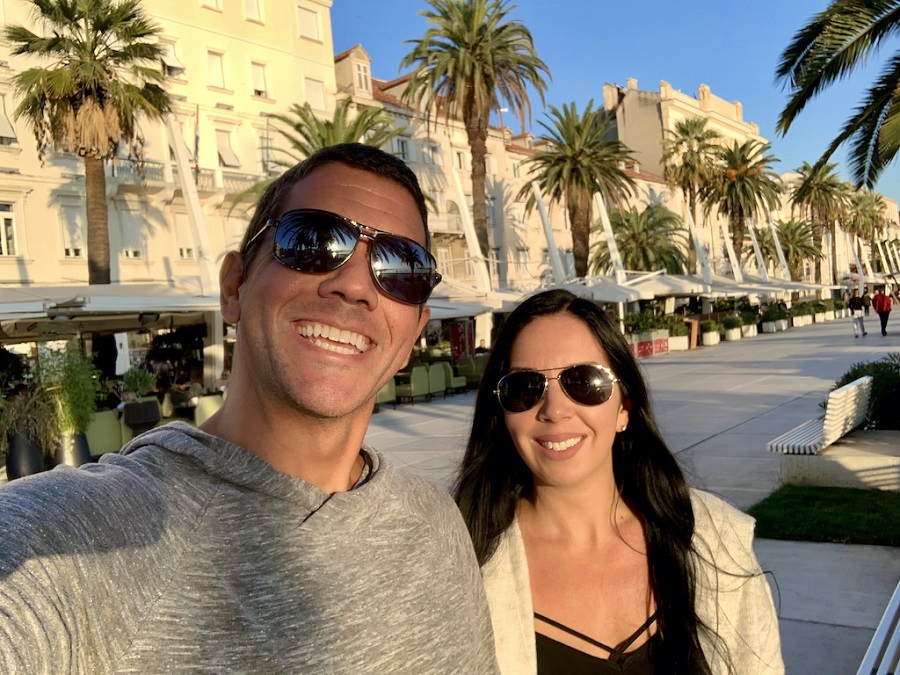
Tell us a bit about you and your work.
We both grew up in Massachusetts (USA) about one hour south of Boston in a city called New Bedford. Like most people, our twenties were filled with jobs we hated. But one good thing was that we both happened to be working at one of those awful jobs at the same time. We started dating in 2001 and by 2009 we had gotten married.
At that point in time we couldn’t take working jobs that we hated anymore and we finally got the courage to venture out into the world of self-employment and started our own web design company. It was one of the scariest things we had ever done, but it turned out to be one of the best decisions that we ever made.
Eleven years later, we’ve created a thriving web design company that creates websites for small to medium-sized businesses in the USA. The best part is that we get to do it together, from anywhere in the world. We are really lucky because we don't just love each other, we actually like each other too.
Pros and cons of working remotely?
One of the biggest pros of working remotely is the freedom and flexibility that this lifestyle offers. Like any other job, some days can be stressful and make you want to pull your hair out, but the good days far outnumber the bad. At the end of the day, our clients don’t care how we get the project done, they only care that we complete the project on time and deliver a high-quality end result. This means we don’t have to work a set “9-5” schedule.
Because (for the most part) we are able to choose our own schedule, we don’t have to wake up to an alarm clock. Working remotely also means that we don’t have to drive to an office every day, which saves both time and money. We don’t have to sit in a cubicle for eight hours a day and we have zero office drama.
Working remotely not only allows you to work from the comfort of your own home but also from anywhere in the world... such as Croatia! Once you experience this lifestyle, your days will stop being black and white copies of the day before and they will come alive with bursts of color. Your life will finally have some flavor. If you choose to add the traveling aspect to working remotely, you’ll get to see gorgeous places, have conversations with people from other cultures and eat interesting food in faraway places. You’ll become the exotic “International Traveler” in your family!
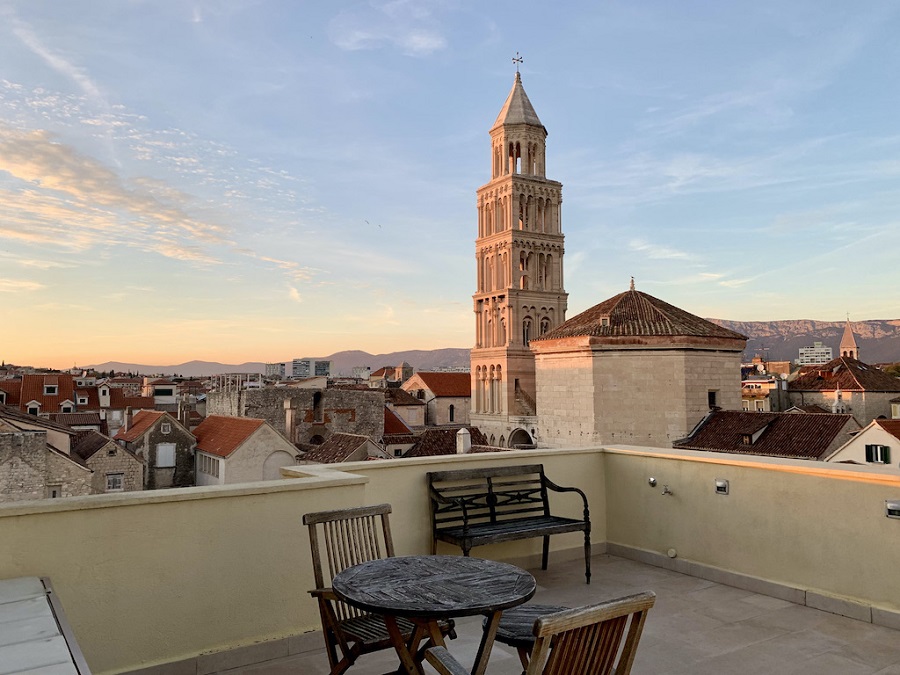
Now onto the not-so-good things.
Remember being a kid on Christmas morning? You would jump out of bed, run to the brightly colored tree in the living room, grab the biggest present you can find and yell out “Mom, can I open my presents now? Pleeeeeeeese?”
But it wasn’t time to open presents just yet and you were told to wait.
Devastated, you rolled your eyes and let out a “uuugggggghhhhhh!” as you sulked your way into the kitchen to get some cereal.
As digital nomads we feel like this on most days.
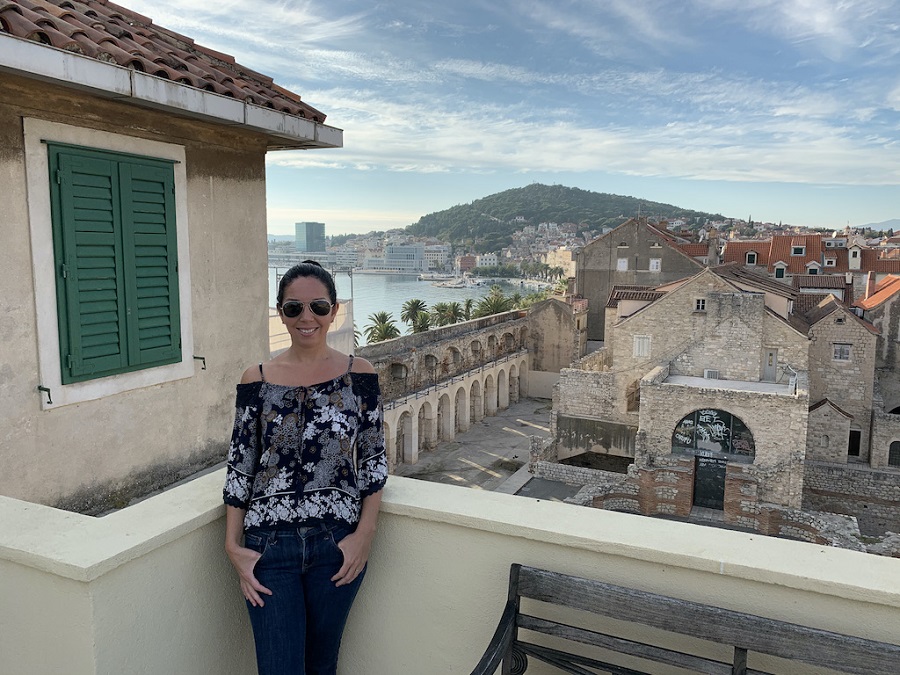
We know that there is an amazing city just outside these AirBNB walls but we also know that we can only go out and explore it once we get all our work done. We can’t let our business suffer because we want to go outside and play. It’s like being a kid who is told to wait to open their presents, except now the presents are new cities waiting to be unwrapped. And our work is like a strict mother telling us that we have to wait to open it.
Another downside is that we also miss our family and friends. When you are a “digital nomad” you miss out on things like family dinners, holiday gatherings and birthday parties. Sure, you can make FaceTime appearances for a few minutes at each event but it’s not the same as actually being there.
Like anything else in your life, you have to make sacrifices in order to get the things you really want.
You can’t fly a plane while keeping one foot on the ground.
How did you choose Croatia and specifically Split?
From August to November 2020 we were “digital nomading” in the Caribbean, enjoying the endless sunshine and sandy beaches of Aruba. But you can only stay in Aruba for 90 days as a tourist and that window was soon closing for us. We needed a new country to visit but as US Citizens traveling during a global pandemic, our options were limited.
While researching which countries US Citizens could travel to, we found an article in Forbes magazine that featured Croatia. It sounded like an interesting country, so we looked more into the top travel destinations within Croatia.
One of the locations that immediately caught our attention was Split.
It seemed to have an old-world charm perfectly blended with modern-day amenities. We watched YouTube videos that explored the labyrinth-like alleys of Diocletian's Palace, the smooth cobblestone streets filled with lots of artisanal shops and the many cafes and restaurants located along the waterfront. It seemed to have just about anything that we would want or need (all within walking distance) plus gorgeous palm trees right along the Adriatic Sea.
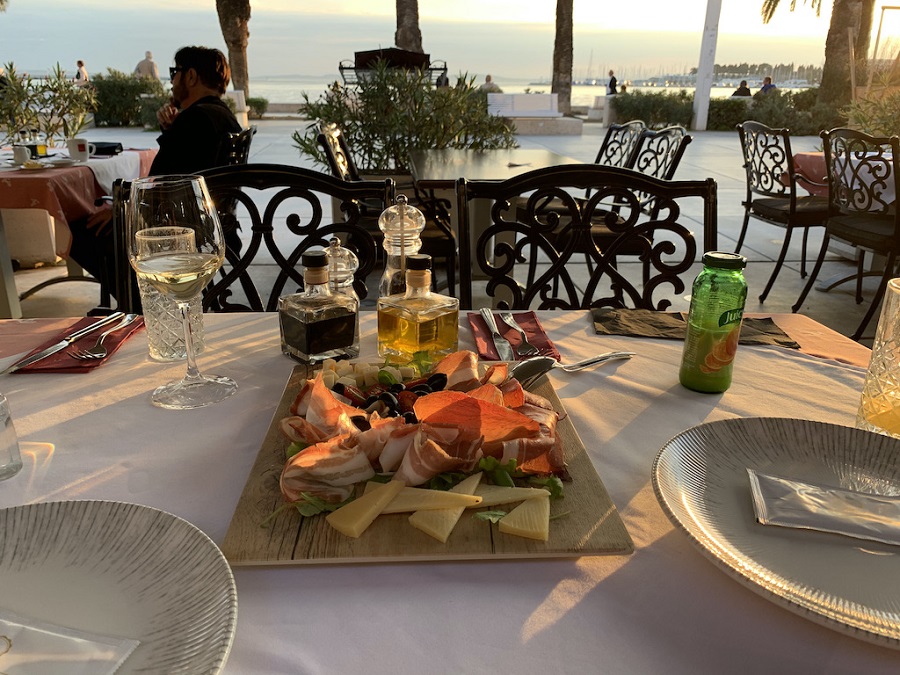
Once we arrived in Split and saw the majestic views, it was love at first sight.
It was even better than what we saw in the YouTube videos! We were also pleasantly surprised that overall Split was reasonably priced and best of all very safe!
Another great thing about Split is Marjan Park. Just to the west of the palace walls there is a large elevated area of trees. If you walk up the southern side pathway and you turn around, you’ll see something you’ll never forget.
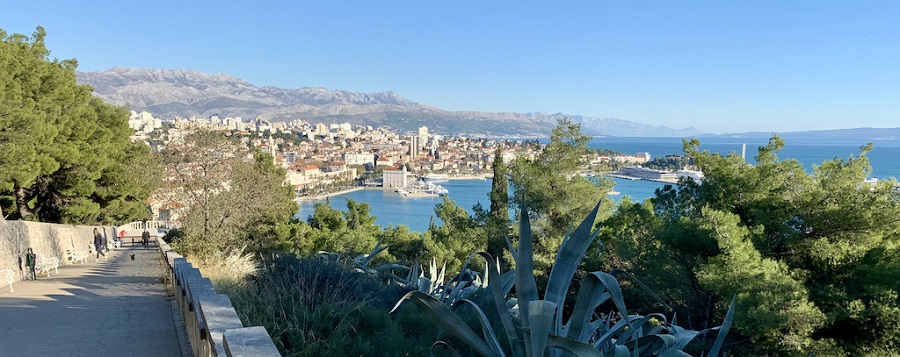
In one breathtaking glance, you’ll see all of the ancient architecture with the cream colored walls and orange roofs, the perfect blue sea and sailboats, the inspiring green trees and the faded mountains far off in the distance.
It’s one of the most spectacular views we have ever seen.
What’s important for a destination to offer to be compatible with a digital nomad lifestyle, apart from good WiFi?
While everyone has a different opinion of what is important for a destination to offer, everyone can agree that safety is very important. When traveling to a new place somewhere in your home country or a new country abroad, it’s comforting to know that you can walk around (even after the sun sets) and have peace of mind that you are safe. And that’s one of the many things that we love about Split. It is very safe at all times. We would often venture out for a late-night stroll down the Promenade or through Diocletian's Palace and we always felt safe.
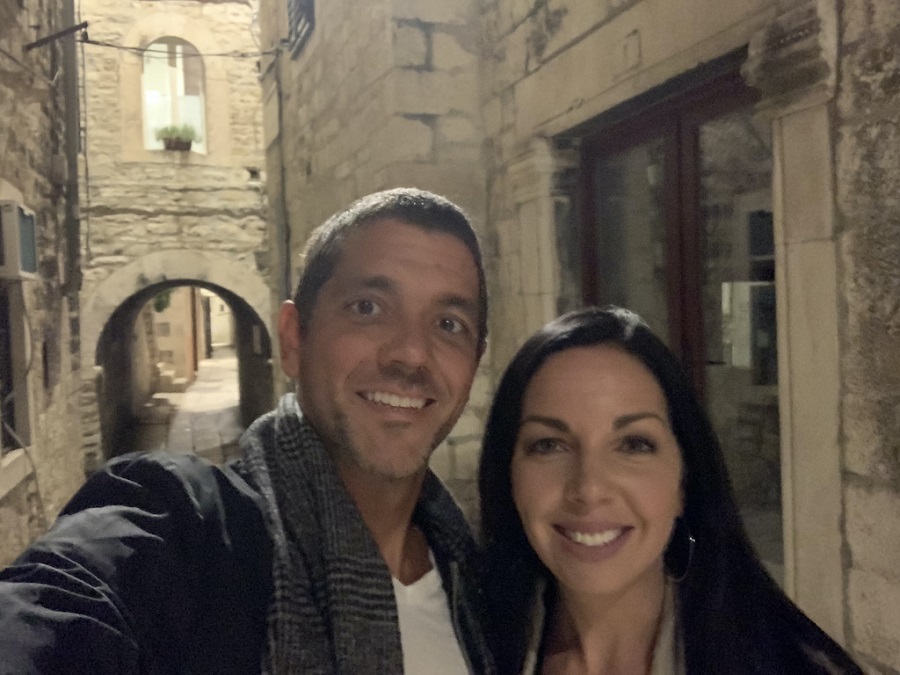
After safety, the location of where you’re staying is the next most important thing to consider. For us that means close proximity to things like beaches, restaurants and historical landmarks, as well as essential services like grocery stores and pharmacies. The closer we are to those things, the less likely it is that we’ll need to rent a car, which saves us from an unnecessary expense. Another great thing about Split is that even when we wanted to venture out farther than we could walk, Uber is available in the area and there are also bikes and scooters available to rent.
While it’s not a deal-breaker for us if a destination doesn’t offer food and grocery delivery, if they do it’s definitely a bonus. After all, us digital nomads still have a business to run which sometimes means long workdays and not having time to run out to the grocery store. So a grocery delivery service can come in handy… and yes, there are companies in Split that offer this service, which made things very convenient on days we weren’t able to venture out.
What’s your view on the future of remote work?
When COVID-19 first disrupted our species, businesses around the world were forced to make their employees work from home. At first this was a chaotic change but after a few months companies realized that their employees were still able to get the work done remotely. They also noticed employees seemed happier as a result of not having to commute every day and no rush hour traffic!
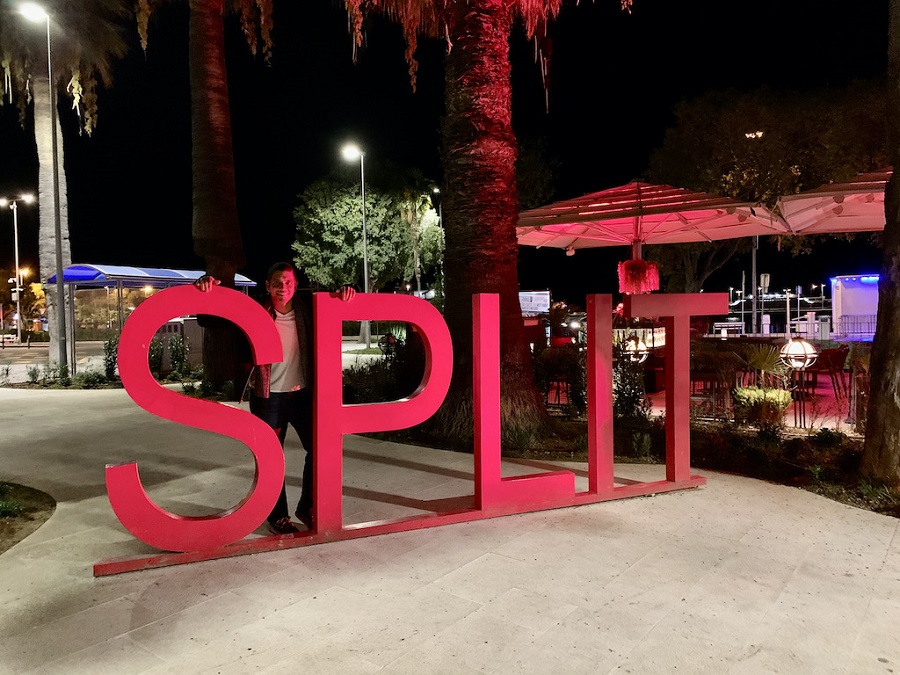
COVID-19 has caused many companies to re-examine their business model. They are starting to see remote work as a way to not only have happier employees but also lower their overhead costs, creating a win-win for business owners. Happier employees tend to be more productive with their work and are also more likely to continue to work for a company. And the more employees that a company is able to have work remotely, the more likely it is that they can downsize their office space and in some cases completely eliminate it, which will greatly reduce their expenses.
So we think that as time goes on the ability for people to work remotely is only going to grow, making it an ideal time for anyone who is looking to travel to become a digital nomad.
Do you have any advice for people looking to make the transition to digital nomad life?
Lower Your Expenses
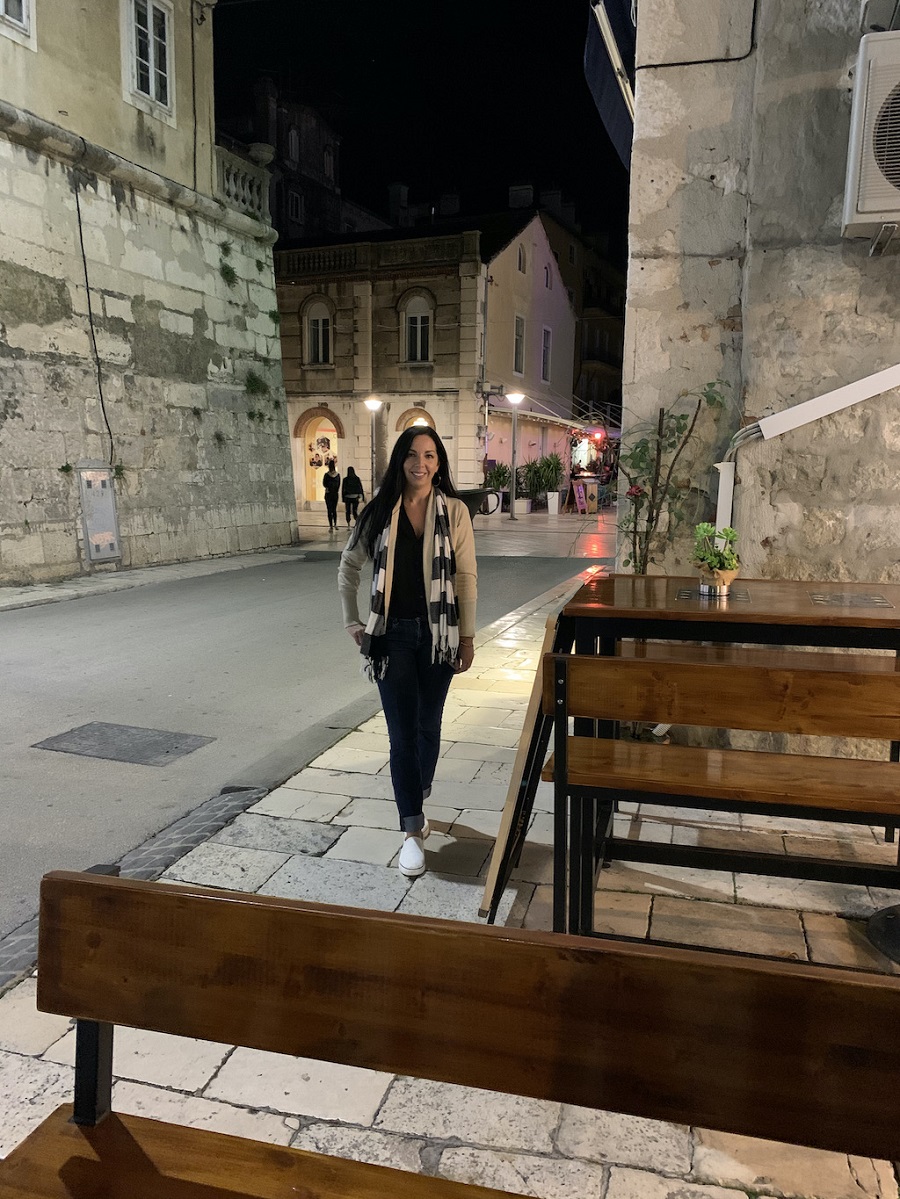
Before you start your journey as a digital nomad see if you can lower your expenses. Would you believe that we’re actually saving money while travelling the world (without giving up the lifestyle that we’re accustomed to)? The reality is that this lifestyle is allowing us to travel the world while saving money that we can then use for fun adventures. Before becoming digital nomads, we typically would go on one or two week-long vacations each year because that’s all we could afford. We realized that there is a lot more to see in the world and at that rate it was going to take us many years to see it all. And honestly, how much can you even learn about a place when you’re only there for a week? So how did we actually lower our expenses? We hired a property manager and he got our house in Tampa rented. We were able to rent it for more than our mortgage (which actually puts some extra money in our pocket each month). With our house rented that means we no longer have any utility expenses (water, electric and internet; it’s all paid for by our tenant)... which saves us hundreds of dollars each month.
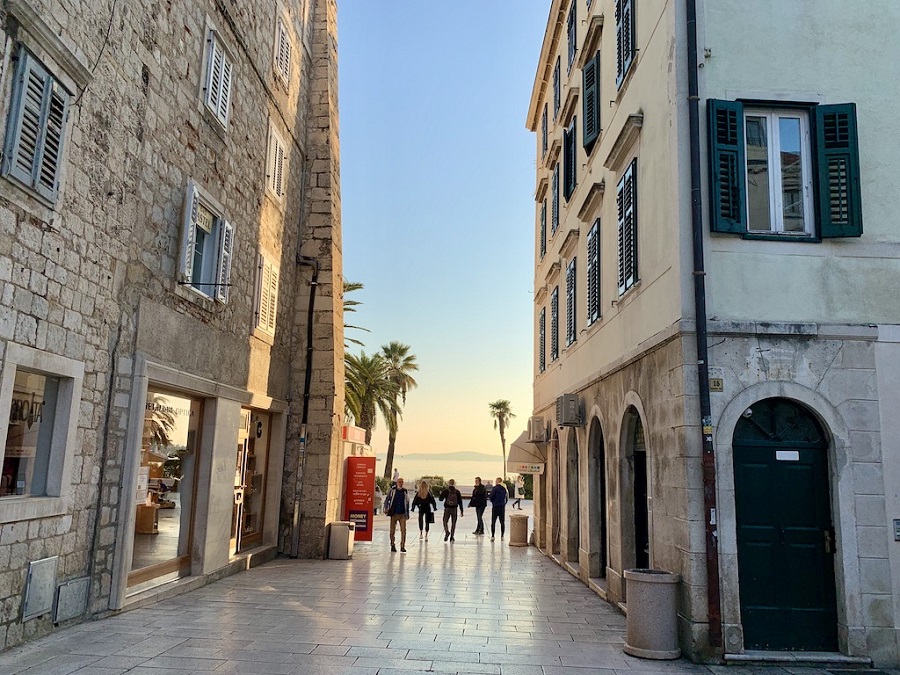
Since we knew we were going to be travelling long term, we sold our car which means no more car payment or car insurance, saving us even more money.
These are just some of the ways that we were able to cut down our expenses. Obviously everyone’s personal financial situation is different, but the reality is there are lots of ways to cut down on your expenses, all while getting to explore new places around the world. Change Your Schedule
Create a work schedule that revolves around meeting a deadline. This allows for more flexible days. For example, instead of having to be at your laptop at a certain time every day to complete your work, change your arrangement to get the work completed by a certain date. This is how our business operates. When we get a project, we tell the client what day we will have it completed. Not only does this type of business model give you flexibility to create your own schedule, but it is very helpful when you are in a vastly different timezone than the people you are working with. Most of our clients are located in the East Coast of the United States and Split is six hours ahead of that time zone, so if we had to be available to work at the normal business hours of our clients, the time zone difference would make it very challenging. If you’re an employee of a company that requires you to do your work / be available on a specific schedule, working remotely from a different time zone can be challenging, but not impossible. If that’s the case, we recommend that you be mindful of the timezone when you’re selecting a destination and find a place that compliments your work schedule.
Try To Make Yourself Smile
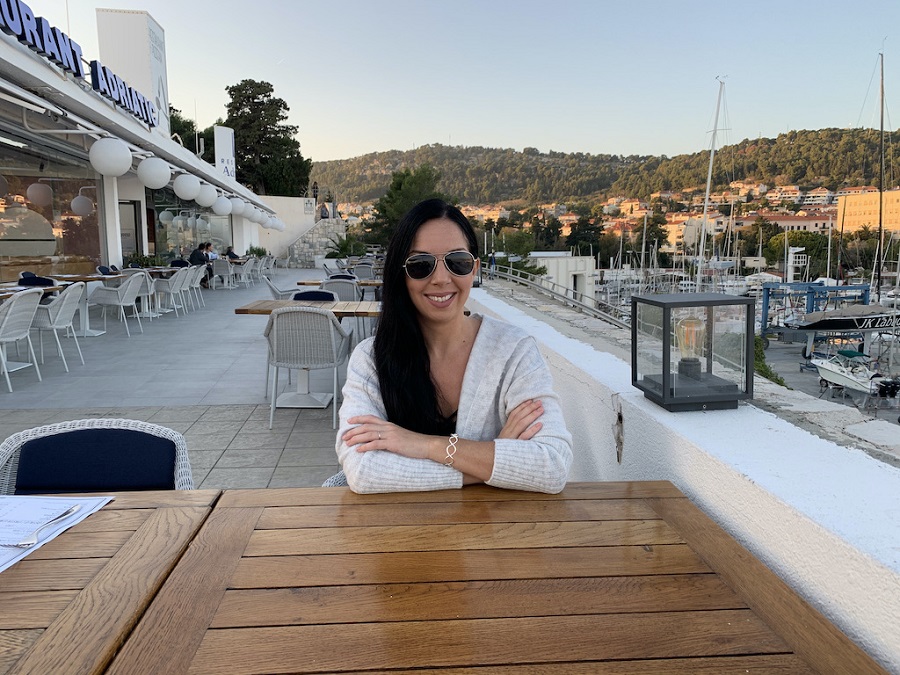
If you’re even a little bit interested in this type of lifestyle, do it! Give it a try on a short term basis and see if it works for you, there is no rule that says you have to do it forever.
Even if it isn’t feasible for you to work remotely with your current job, remember there has never been a greater opportunity or demand for remote work then there is right now. You may be surprised at the remote work opportunities that are available.
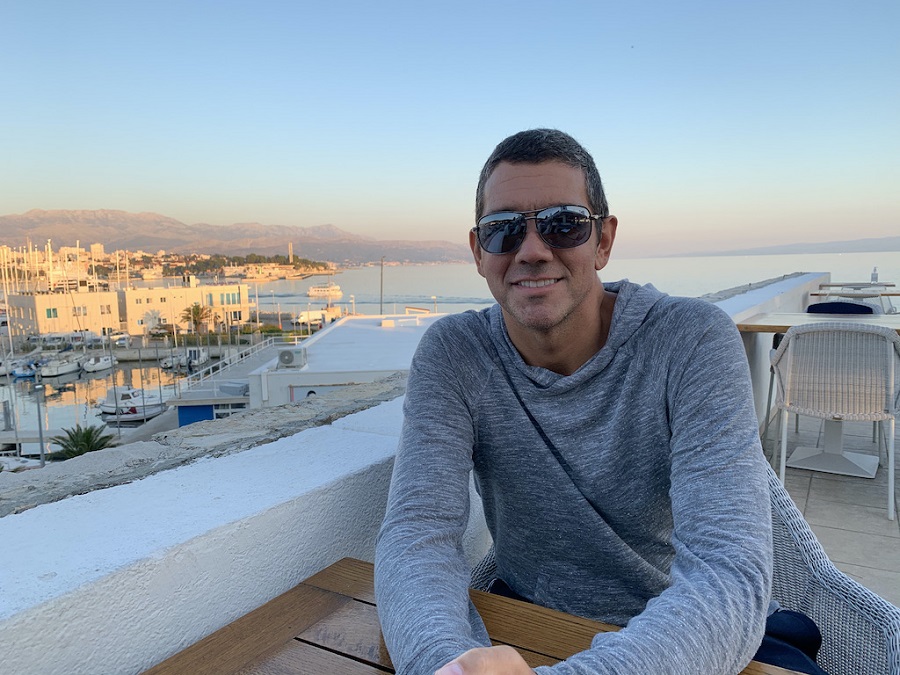
Here is some final advice on making this decision (actually any decision): do the thing that will make your 90-year-old self look back and smile. Most people tend to look back in life and regret the things that they did not do, rather than the things that they did do.
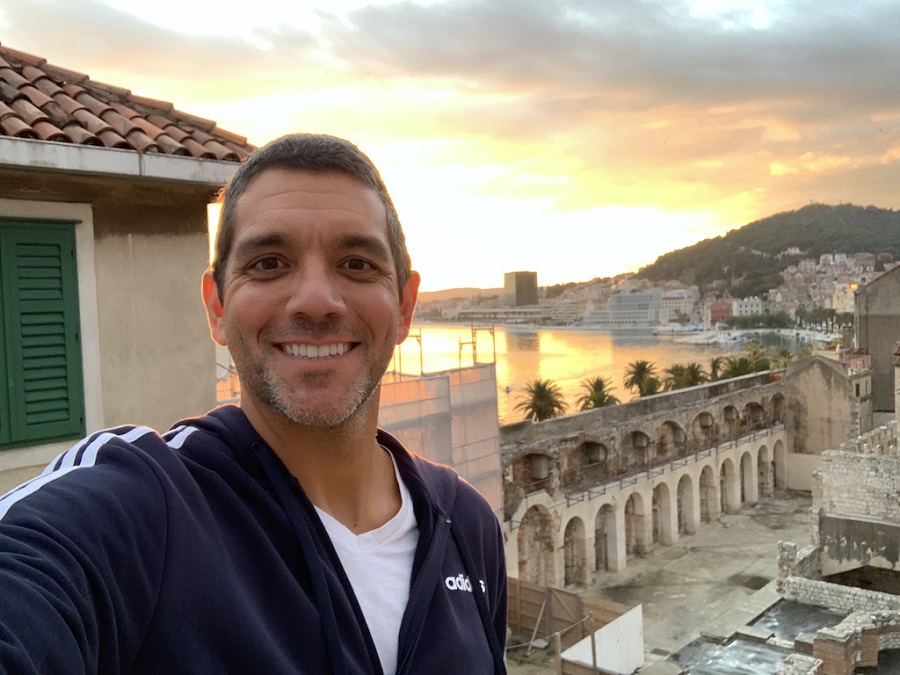
Follow these digital nomads on Instagram:
Amy Anderson https://www.instagram.com/unleashingamy/
Ian Anderson https://www.instagram.com/ianrobertanderson/
Are you a digital nomad in Croatia who would like to be featured in this series? Please contact us on This email address is being protected from spambots. You need JavaScript enabled to view it. Subject Nomad
Read more: Meet Melissa Paul, Owner of Croatia's First Digital Nomad Visa.
Meet Melissa Paul, Owner of Croatia's First Digital Nomad Visa
January 26, 2021 - An historic day for digital nomad tourism in Croatia - meet Melissa Paul, proud owner of Croatia's first digital nomad visa. Find out how she did it.
It has been quite a day in the world of digital nomads in Croatia.
After Prime Minister Andrej Plenkovic delivered on his promise to introduce a visa for digital nomads in Croatia last year by pushing changes to the tax code and Aliens Act, effective January 1. The final details were imminent, as was the promised online application process, with a timeframe of the first quarter of this year the target for the introduction of the visa.
And then, just before lunch - this from the man whose open letter to Plenkovic asking for the visa to be introduced got the ball rolling 199 days ago - Jan de Jong: US Citizen Gets First Croatian Digital Nomad Visa.
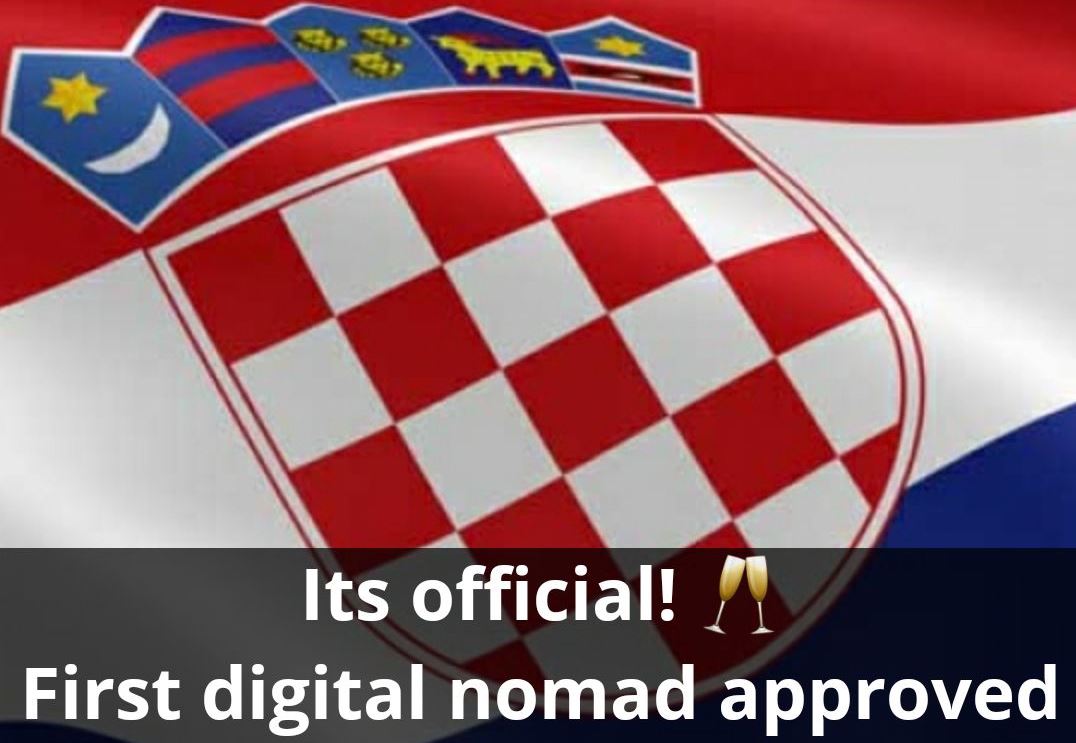
Jan's news - delightful as it was - was a little thin on detail. Who WAS this successful digital nomad visa bearer, and how did he/she do it?
Some phone calls were made, and our groundbreaking nomad was tracked down to Istria, and the town of Labin. Not only that, but Melissa Paul was more than delighted to tell her story and explain in great detail the process and the documentation required.
Melissa Paul is a brand storyteller, social media manager, and blog editor for design, travel, and lifestyle businesses.
Raised in Southern California, Melissa she was born craving adventure and kept traveling east to find it. From the mountains of Arizona to the big cities of Los Angeles, New York and Philadelphia, Melissa managed to get all the way to Croatia, first landing on the island of Krk before falling in love with the hilltop artist town of Labin, Istria. In the six years she’s called Croatia home Melissa has renovated an old stone house and learned the benefits of slowing down to enjoy the beauty of everyday life in Croatia.

1. Let's start at the beginning. Why Croatia? What are you doing here and how long have you been here?
I came to Croatia in 2014 with my then husband, seeking a slower lifestyle in his parents’ home country. We divorced in early 2018, but I couldn’t imagine leaving my home, neighbors, and friends in Croatia!
2. As an American, you obviously have residency issues without the digital nomad visa. What was your particular situation?
Yes, it can be, and has been, challenging for third-country nationals. Originally, as a spouse of a citizen I was granted a 5-year temporary stay visa. Then, the moment our divorce (which was brought here in HR) was final, that visa also terminated. But, with the help of an excellent attorney, the Ministry gave me permission to finish my existing 5-year visa. (there are provisions in the law for this situation if you have been married and have lived in Croatia together for at least 3 years full-time). Next, I applied for an extension on that visa using ownership of my home as the reason. I was granted that extension for one-year.
This past summer, when I read about the potential for a Digital Nomad Visa, I got excited as I realized that not only do I qualify as a digital nomad, but it could be my only way to stay! But this past October, when it was time again for me to reapply for another stay visa, the Digital Nomad Visa was not enacted. I had no options available to me but to apply for humanitarian reasons. The fear was real, with COVID out of control around the globe, where would I be able to go? Even returning to the United States was not comforting. Of course, to find a way to stay in my beautiful, much safer Istra was my ultimate goal!
3. I understand that the suggestion of you applying for the digital nomad visa came from a rather unusual proactive source - the Croatian police in Zagreb. Tell us about that.
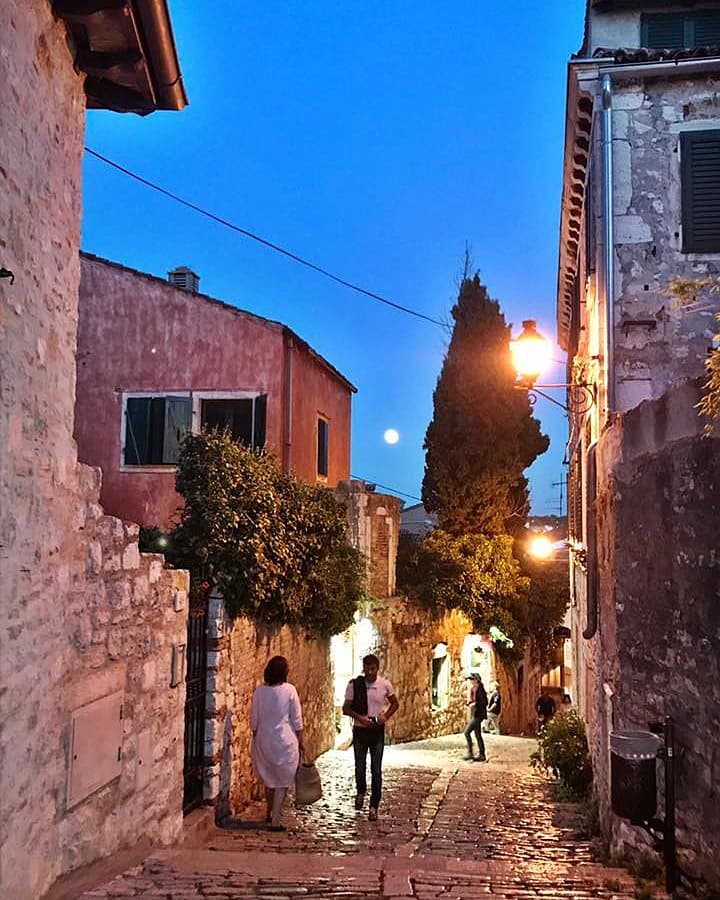
I took the suggestion of many local friends, one of whom has a friend in MUP Zagreb, and applied with letters from neighbors, local businesses I had helped, and even my local Catholic church. All to show that I had become a part of the community around me. But to no avail. I learned just days before my current visa expired that this humanitarian reason was not enough. I was denied. But in that “decision” from the Ministry in Zagreb was their suggestion that I reapply quickly (within 36 hours) using the new Digital Nomad Visa option as they could see that I qualified. Sadly, I was not given that letter to show you as it was an internal document from Zagreb to Labin MUP, but I was shown the section that offered the exact paragraphs in the Alien Act that were recommended.
4. Now - and I want you to give us as much detail as possible as there is a LOT of interest in this (you will forever be known as First Nomad Visa Lady...), take us through the process of what happened when you went to apply.

Okay, these details are spread about here in different answers. The documents I needed to provide:
1) Completed Form 1A provided by the MUP office, noting the reason of requested temporary stay as DIGITAL NOMAD, and the length of requested stay;
2) OIB (personal identification number);
3) Valid Passport that shows it is active beyond the timeframe requested in my visa application;
4) Written statement from me that I am a Digital Nomad with a company/work/clients outside of Croatia, why I want to stay/work in Croatia, how long I have been a digital nomad and any detail about my services. Specifically, I was told to reference “communications” and “technology” in my statement as services I provide as well as where the company I own is registered; and offering any detail about the names and locations of the companies I work with. This document was written by me in English but professionally translated into Croatian, then my signature was notarized by a local, Croatian notary;
5) Since I own my company (US-based) servicing clients in Mexico and the US, I was asked to provide a copy of my business registration, articles of incorporation, and proof that the company was active and in good standing. The latter was obtained online from the US state in which I originally incorporated my business in;
6) Written statement of some form from my employer, in this case, an Employment Agreement from my own company, stating that I work for the company, what role I service, what my annual salary is, and the term of my contract. This agreement needed to be stamped with the official company seal. This document was written by me in English but professionally translated into Croatian, then my signature was notarized by a local, Croatian notary;
7) Proof of health insurance coverage for the length of the visa term requested. In my case, I went to the HZZO office and got a statement from them that I was paid up. Otherwise, proof of the foreign health insurance coverage is required;
8) Proof of minimally 28,800 kuna sitting in my bank account at the time of application. Better, of course, if this was shown in a Croatian bank account. Otherwise, a statement from the foreign bank on their letterhead that this amount is in the account.
5. How long did the process last and what did it cost?
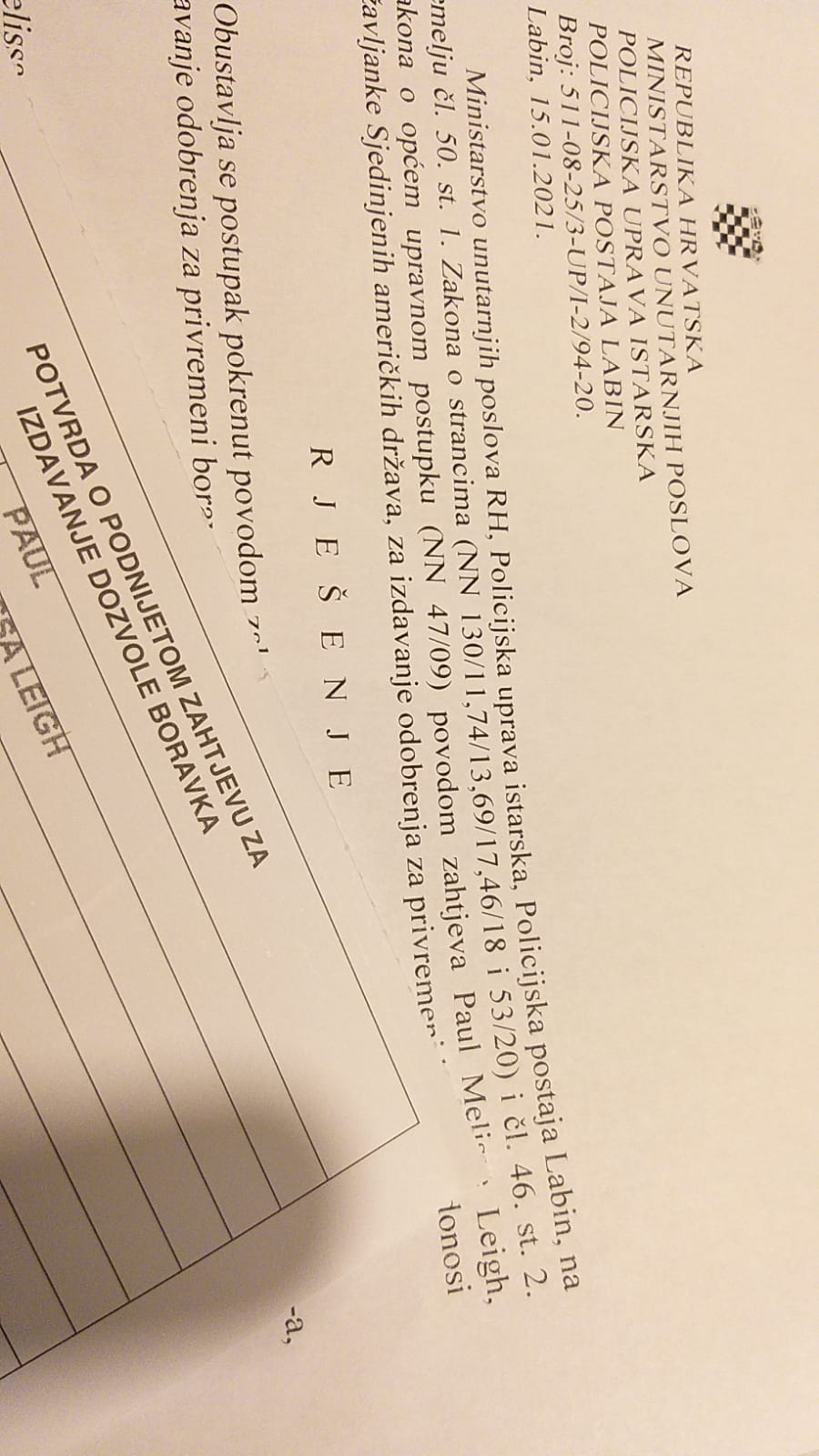
I applied in mid-November 2020 for my Temporary Stay and received a stamped letter from MUP Labin that the application was received and in process. On January 11th, 2021, I received a call at my home telling me I was denied and should come to their office in the police station immediately to discuss other options. I was told to bring a friend who spoke Croatian. I was there in an hour and they saw me immediately. I was shown the decision referenced above and it was read by my friend, and the suggestion to apply as a Digital Nomad was explained in detail. I was told I needed to get all the required documents back to MUP as soon as possible, and before my current visa expired in 4 days. I returned with all documents and ID/Passport photo. It was approved and I was given the decision, fee requirements and tax stamp requests. Tax stamps of 35 kuna were required and I paid 590 kuna for the visa application.
6. Is it actually a visa? Do you have a stamp or piece of paper you could share with us?
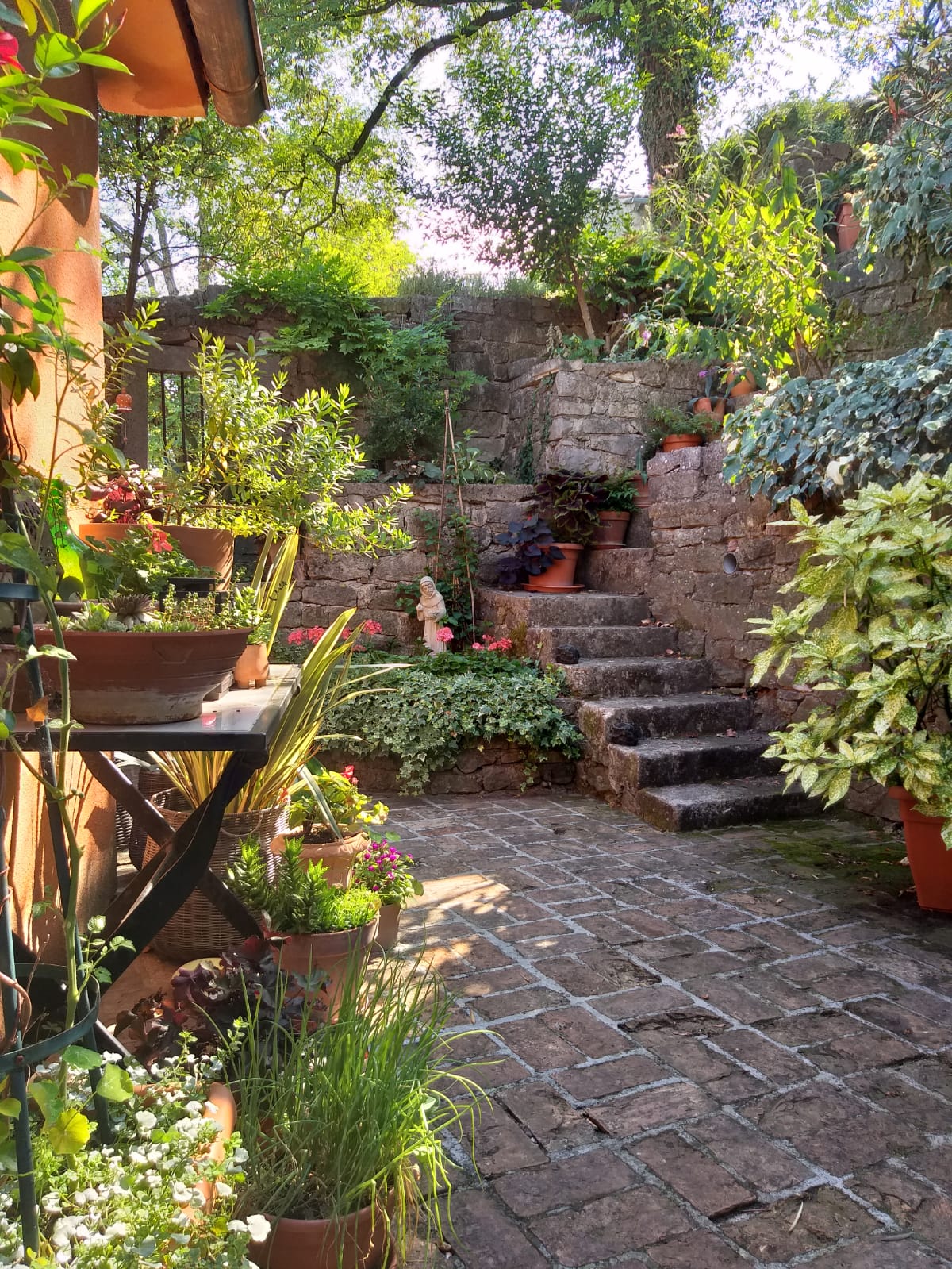
It is a reason to get a Temporary Stay Visa. So, the only document I have is the Rjesenje (decision) stating it was approved and the tariff stamp (tax stamp) of 35 kuna was due. Once I showed receipts from my bank that I paid the fee and brought back the tax stamps (available at a local Tisak) I was given a temporary white ID card and told to return in 3-4 weeks for the official card with photo.
7. When did you realise that you had become First Nomad Visa Lady - the first person to get the Croatian digital nomad visa?
My dear friend Isabel Putinja told me I must be the first, but I didn’t believe her! And then today I got a call from the Ministry in Zagreb who told me the article in TCN was about me… they asked if I would give them permission to use my name, etc.
8. Tell us how you feel now that you have it, and what are the exact conditions?
How I felt was GREAT RELIEF! To have the chance to stay here in Croatia for another year, and to not have to leave my home, my friends and neighbors, is amazing! Not to mention all the added complications COVID brings… I really have made my home here in Istria, but to have the opportunity to stay here while working remotely, is a gift. Truly! I have been a digital nomad for years and whether or not I own my home doesn’t negate the fact that I work for foreign companies while living on the other side of the world from them.
I have a new Privremeni Boravak for 12 months, which is the length of the DNVisa. It cannot be renewed or extended. When it expires, I either must have a stalni boravak (permanent residence) in place, a sexy Croatian or EU husband, or live out of Croatia for six months. (well, 3 months out, 3 months in as a tourist).

9. How have your plans changed now with regard to your stay in Croatia?
Getting my new temporary stay with the digital nomad reason means I can continue to write about Istria and Croatia, a personal project in the works for some time now. BUT, it affords me the opportunity to get a permanent stay visa as you must have one while the other is in process!
10. What advice do you have for others who are also looking to apply? What should they take with them to the police station?
Take a lot of patience with you, each time you go! And, someone who speaks fluent Croatian, as beginner’s Croatian is not enough for when faced with bureaucratic hurdles to jump! The best language is a smile, I found, but when I left frustrated I would be reminded that this is what it is, for everyone, and that it is not personal. I also believe going with everything copied already, translated and notarized is super helpful to speeding things up.
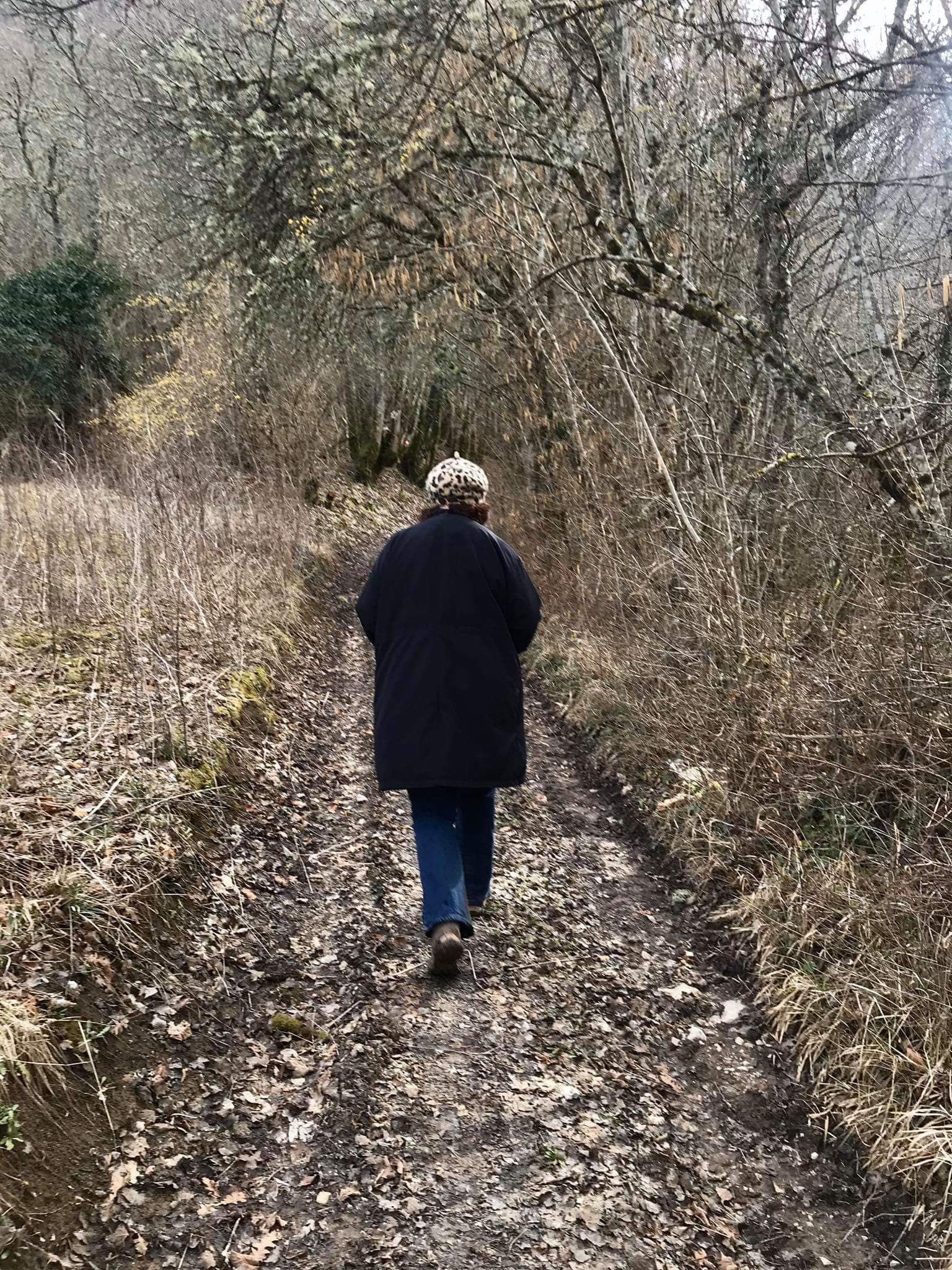
Fabulous stuff, and thanks, Melissa, for going into so much detail. You can follow Melissa Paul, Croatia's First Nomad Visa lady, on Instagram.
As I wrote in the earlier piece today announcing the first visa, the finishing touches are being applied to the process, including online registration forms. I would expect this all to be in place by the end of the first quarter of 2021, quite probably next month. We will bring you the latest in the dedicated TCN digital nomad section.
If you are applying for a digital nomad visa via your local police station and would like to share your experiences, please contact us at This email address is being protected from spambots. You need JavaScript enabled to view it. Subject Nomad Visa.
Zagreb Tourism Adjusting to the Digital Nomad Opportunity
January 25, 2021 – After a challenging 2020, the digital nomad future is looking bright for Zagreb tourism.
It is almost exactly a year since I wrote an article called Why Zagreb is Increasingly Attractive to a Growing Number of Digital Nomads. A year, but seemingly a lifetime, ago. But while 2020 was a terrible year for most of us, it was a very good one for the digital nomad movement, with Zagreb making more advances to position itself as one of the most interesting destinations for remote workers in Europe once things return to a semblance of normality.
In the pre-pandemic article a year ago, I explored 10 reasons why Zagreb was growing in popularity for digital nomads. A year later, all ten are still valid, with several more to add to the list. Affordability, accessibility, safety, English spoken, excellent food & wine, a great tourist destination, a thriving tech scene, quality medical tourism, proximity to the Schengen zone, and that unbeatable relaxed Croatian lifestyle were the ten hooks for digital nomads a year ago.
And then the pandemic hit, shifting the focus of many lives during lockdown to a more virtual world. It was estimated before the pandemic that there would be one billion remote workers by 2035. That estimate now looks very conservative, as many people got used to working from home and away from the office. Many of those jobs will never return to the office – even more digital nomads for tourism in the future.
While the tourism potential of the concept of providing services for digital nomads gradually took hold globally with the prospect of the new normal, things moved forward much faster in Croatia. An open letter to the Croatian Prime Minister from a Dutch entrepreneur asking for a digital nomad visa resulted in Parliament passing legislation for Croatia to become only the second country in Europe to offer a digital nomad visa.
The final bureaucratic touches are being applied to the new permit, which will allow digital nomads of a certain income level to spend 12 months in Zagreb and elsewhere in Croatia, with no local tax burdens. Legislation has already been passed by Parliament, and the visa is scheduled to be available by the end of March latest.
News of the proposed visa went global, leading to intense interest in Croatian destinations, but it also had another positive impact for Zagreb tourism – by generating interest and attention from the city's tourism businesses, keen to learn how to take advantage of the opportunity.
Initial understanding of the needs of digital nomads has moved on from a year ago when the general perception was that an apartment with clean sheets and decent Internet was 'digital nomad friendly.' More Zagreb tourism businesses are understanding that lifestyle and quality of life are also essential elements of the offer, rather than just a bed and WiFi. Some Zagreb hostels, for example, are adapting to the new reality by offering special digital nomad monthly rental packages, including meals, for a fixed fee, with their outreach services available through their hostel services.
The formation of the Digital Nomad Association is another step in the right direction. The Zagreb-based assocation will be fully functional in the coming weeks, offering a bridge of support between nomads, their hosts and issues with the Croatian authorities and bureacracy. There are plans to educate local tourism providers on the needs of these mobile guests, as well as a platform for services such as accommodation which are 'nomad-friendly' which are certified by the association.
Zagreb tourism promotion has changed in the last year as well, offering even more to the visitor. Arguably one of the best initiatives last year was the launch of Around Zagreb, a new platform combining the treasures and activities in Zagreb the city and the surrounding county. The site has been a revelation since going online, offering countless new options to city visitors which had previously been ignored. From hiking and cycling on Sljeme, to wine tasting in Plesivca, truffle hunting in Turopolje, or a round of golf in Zapresic, the lifestyle options for longer-term remote workers are only increasing in Zagreb.
Tourism is changing, and there are many reasons to be positive. The 10 reasons why Zagreb is increasingly attractive to digital nomads are still as true one year on, with several quality additions to the list after the challenges of 2020.
To follow the digital nomad story in Croatia, follow the dedicated TCN section.


